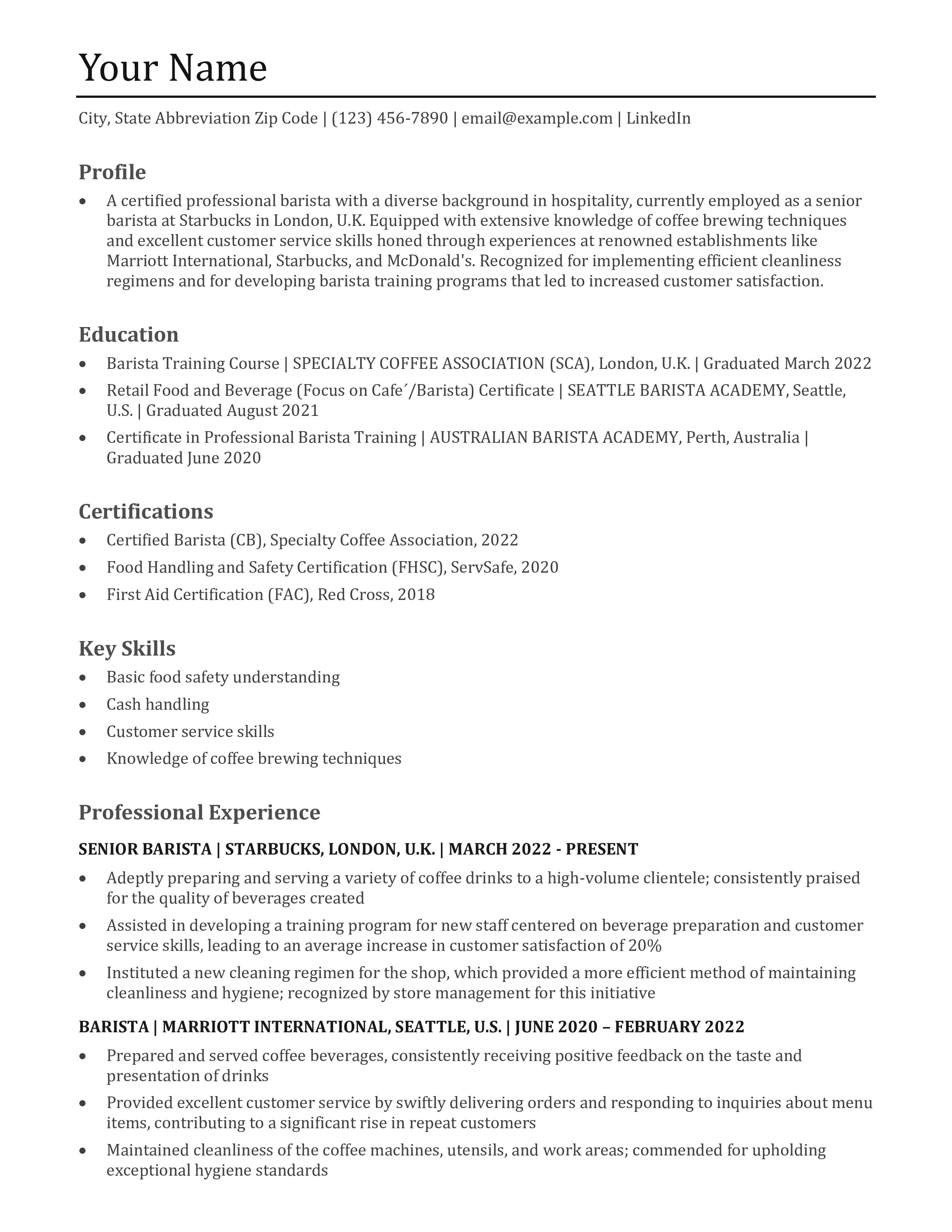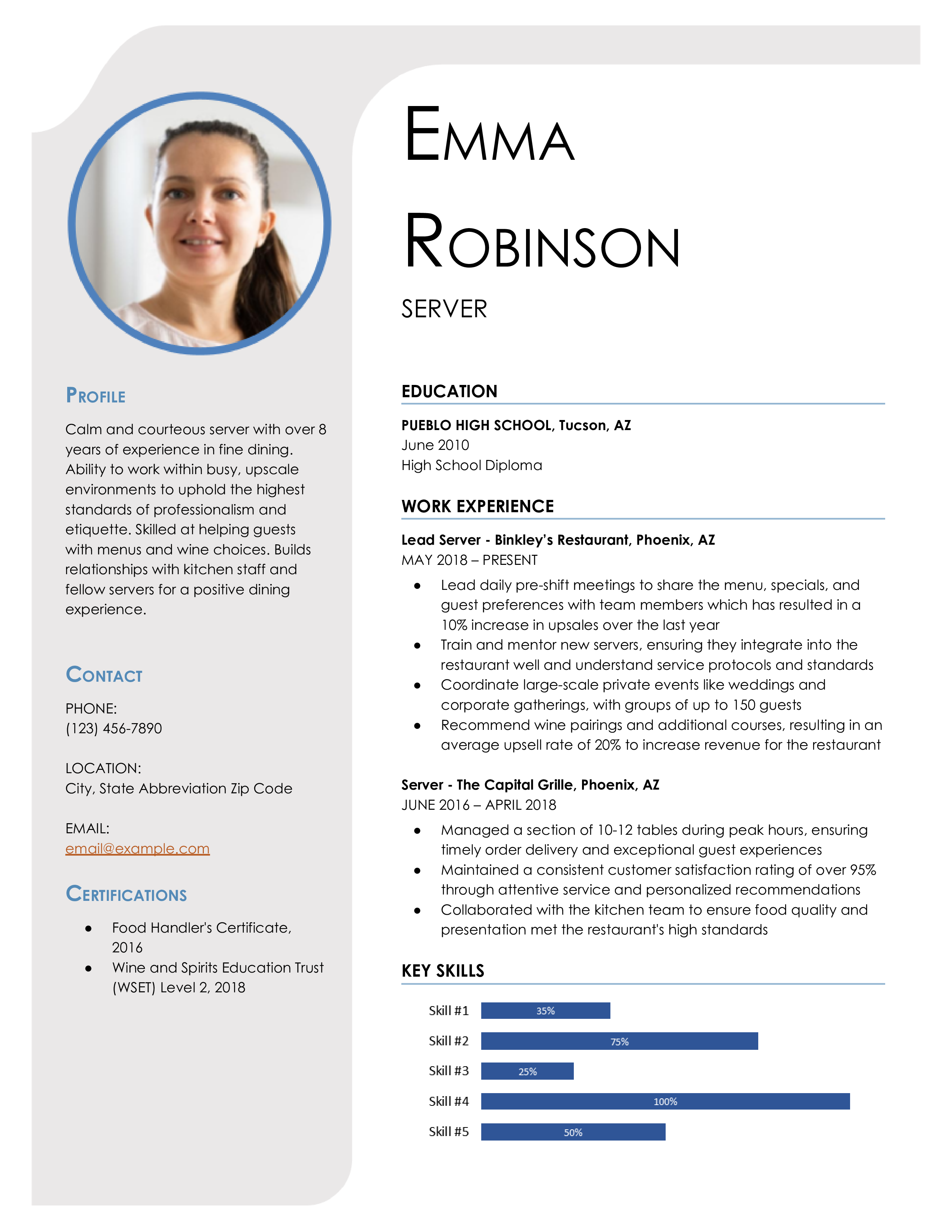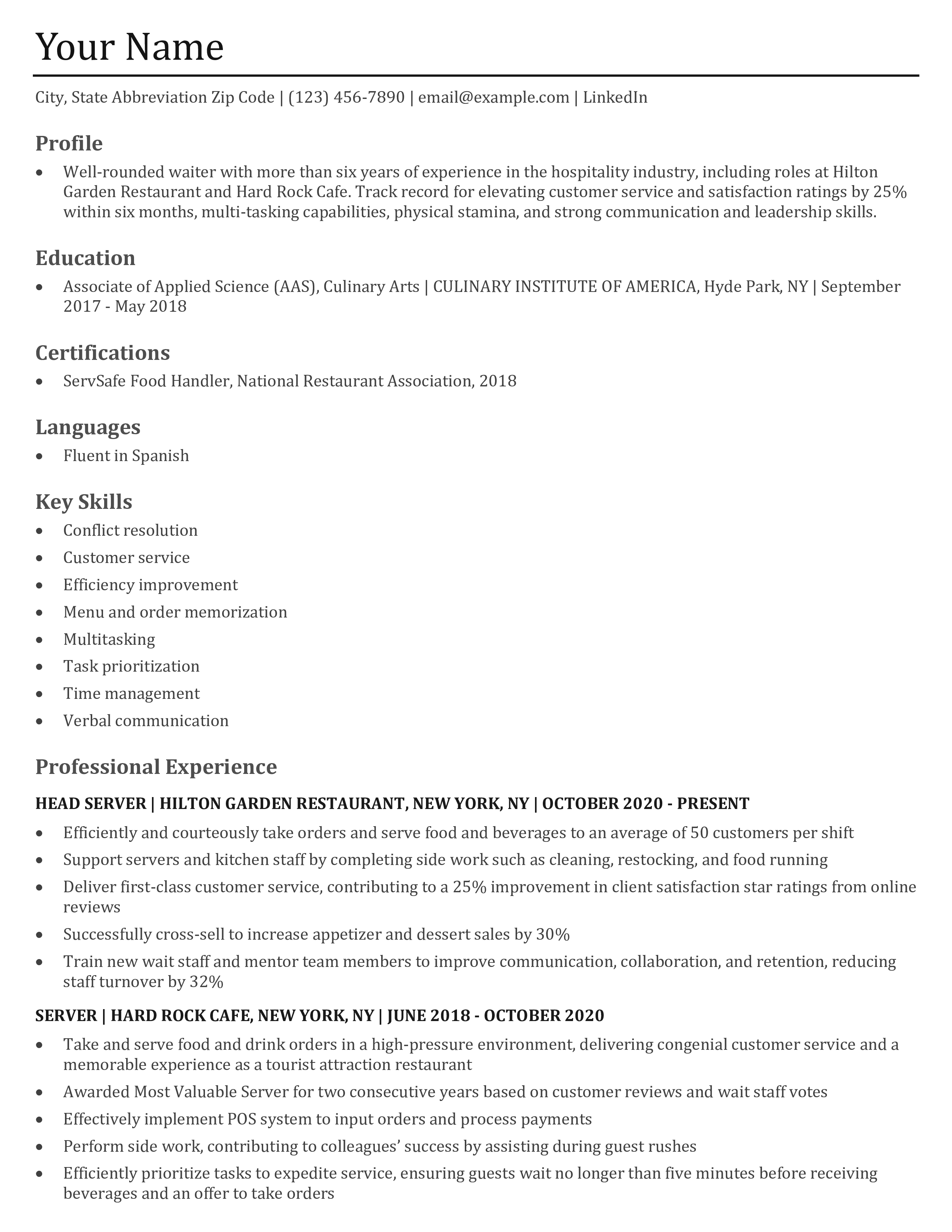A bartender resume is the perfect blend of technical skills and customer service, garnished with a good helping of safety and efficiency. It must prove you can handle a fast-paced environment while delivering high-quality beverages. This guide serves up expert tips and strategies to help you demonstrate a knack for creating memorable guest experiences from behind the bar.
Key takeaways:
- Emphasize mixology expertise: Within the first paragraph of your resume, list any bartending specializations — from craft cocktails to artisanal beer and wine pairings.
- Quantify your success: Use dollar amounts, percentages, and metrics to describe your achievements as a bartender. Think guest satisfaction scores, cost savings, or sales increases.
- Include bartending keywords: To help your resume get through applicant tracking systems (ATS), use words and phrases mentioned in the bartender job description.
Bartender Resume Templates and Examples (Download in App)
Entry-Level Bartender
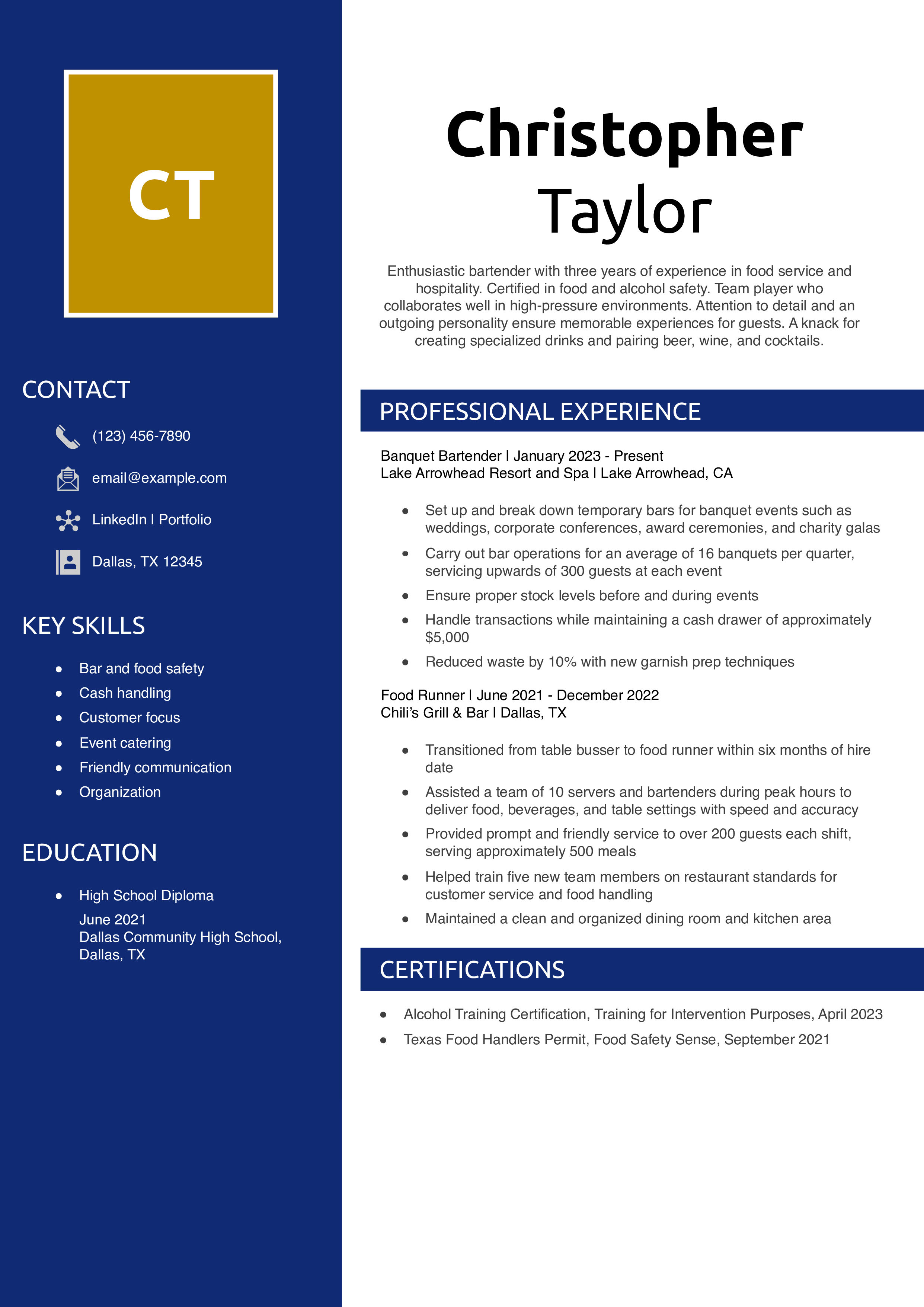
Mid-Level Bartender
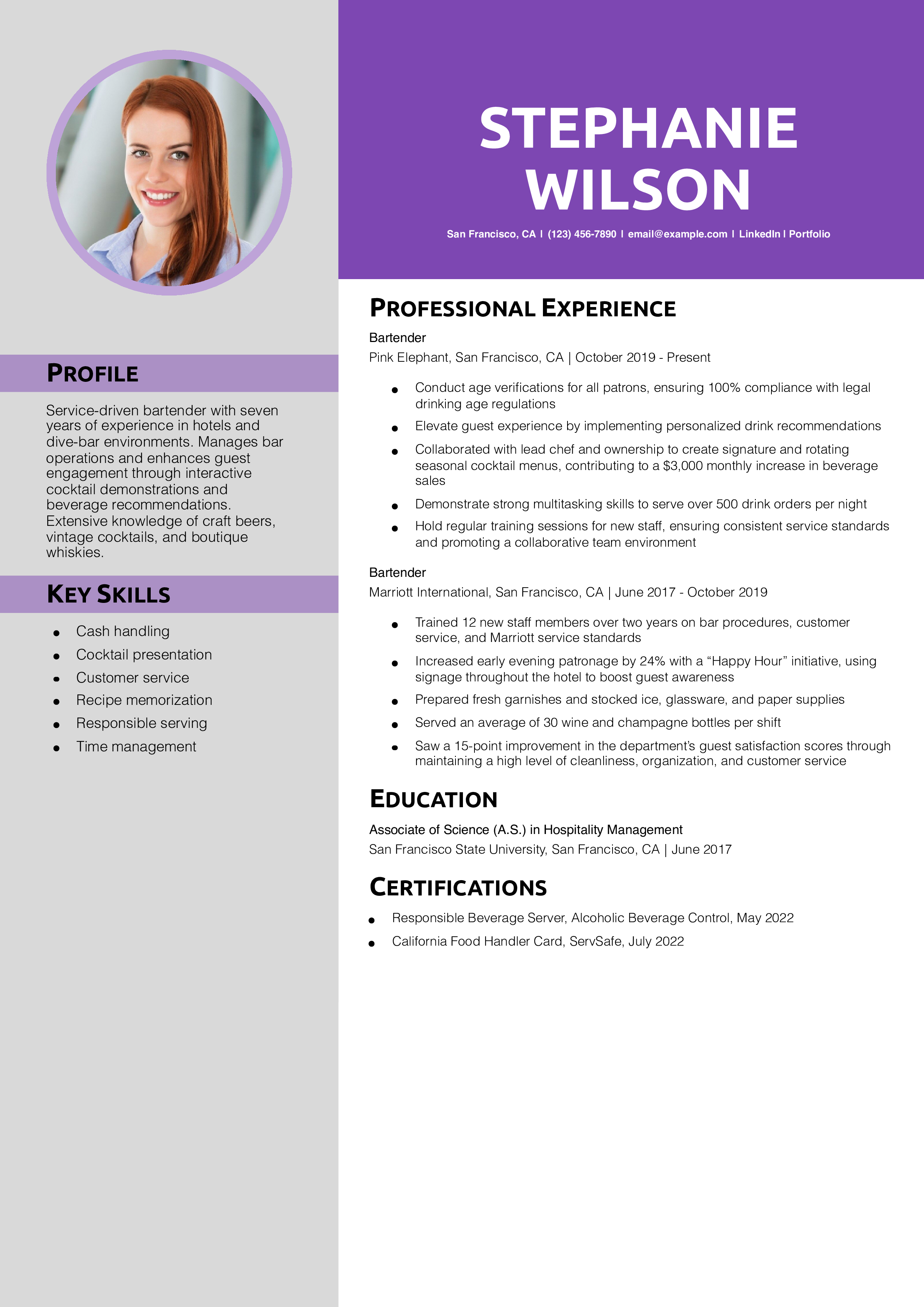
Senior Level Bartender
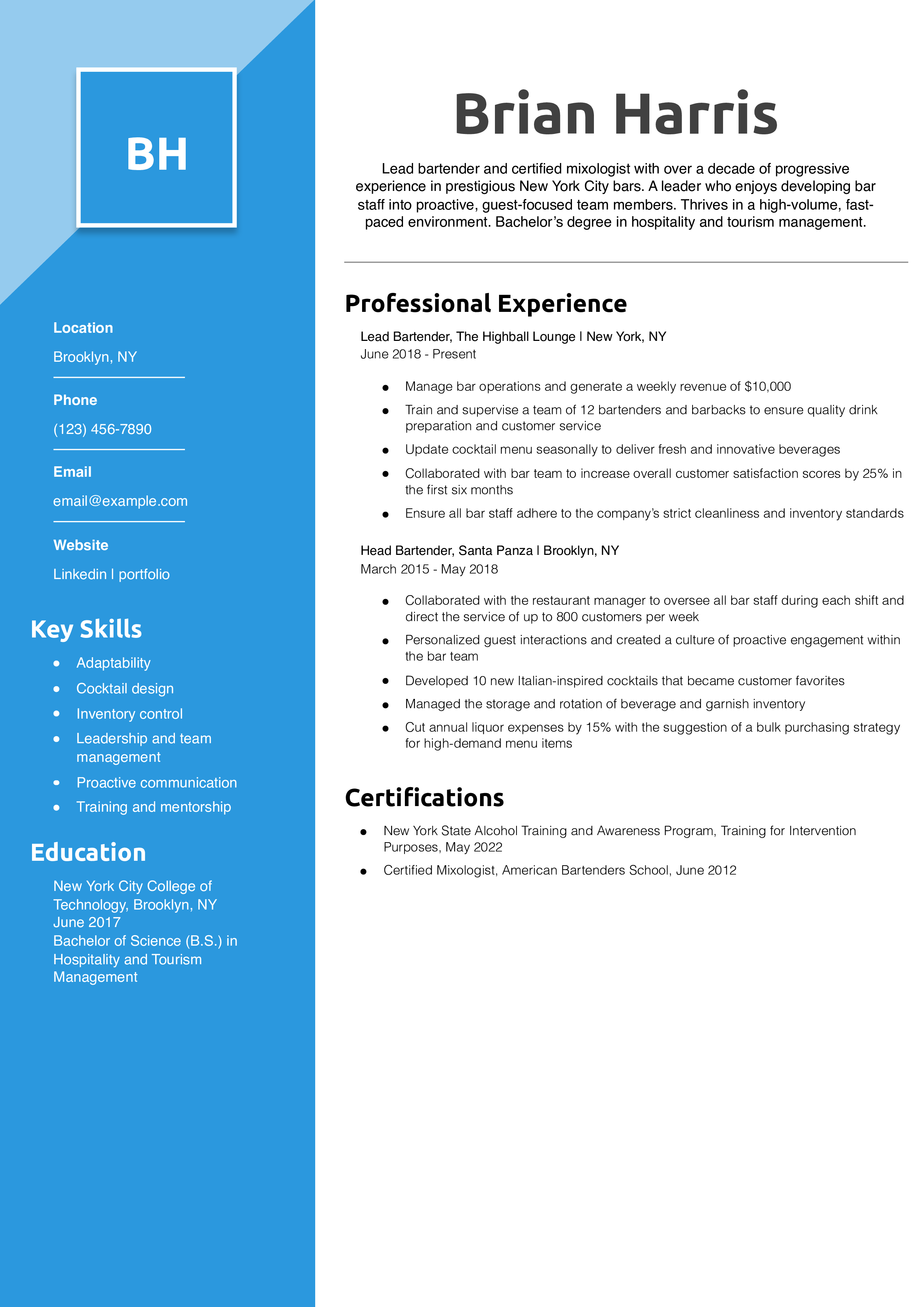
Tiki Bar Bartender Resume Example
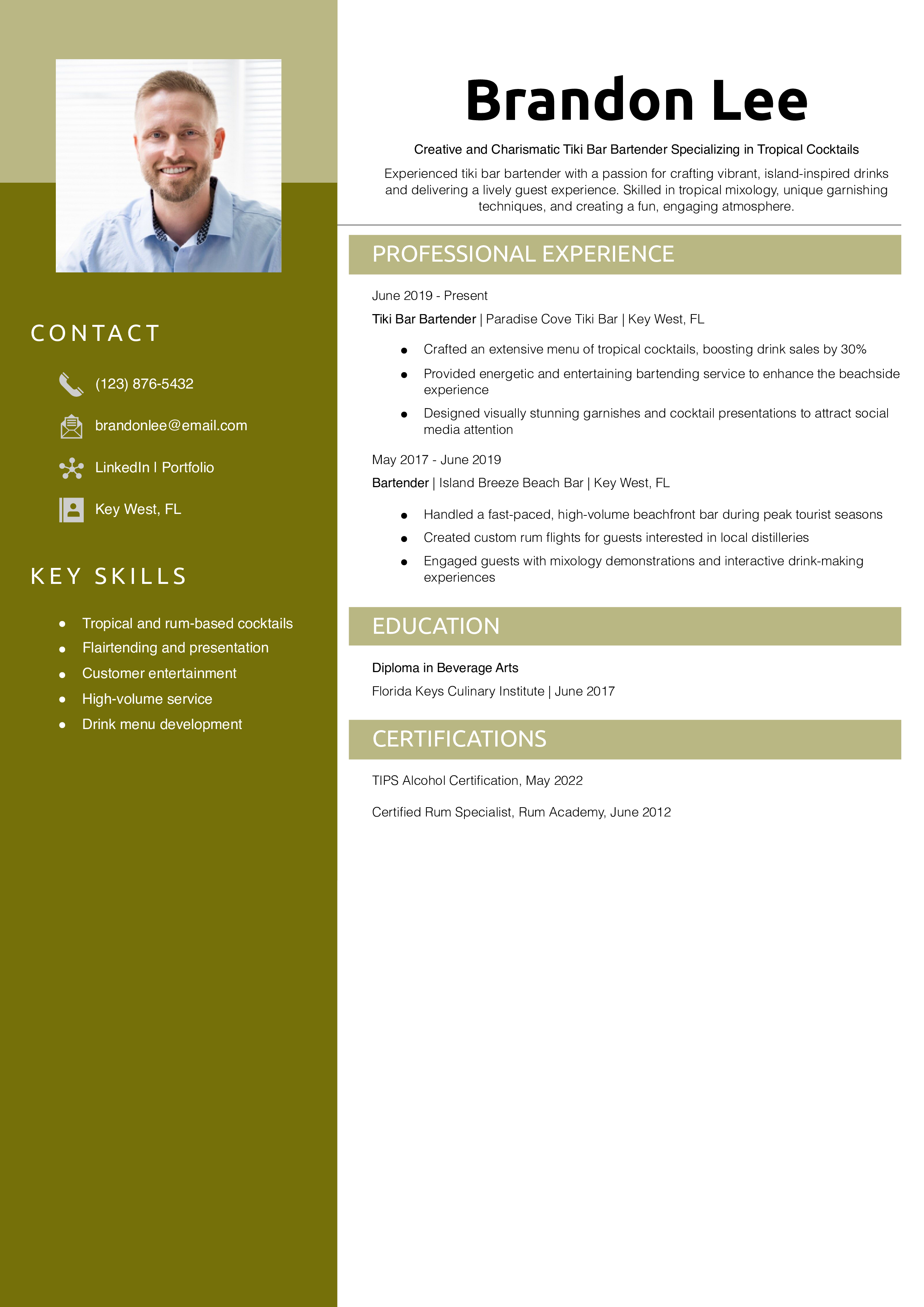
Why This Resume Is a Great Example
Brandon’s resume highlights his creativity and ability to craft unique tropical drinks while providing entertainment. His focus on customer engagement and drink presentation makes him a perfect fit for tiki bars and beachside venues.
Club Bartender Resume Example
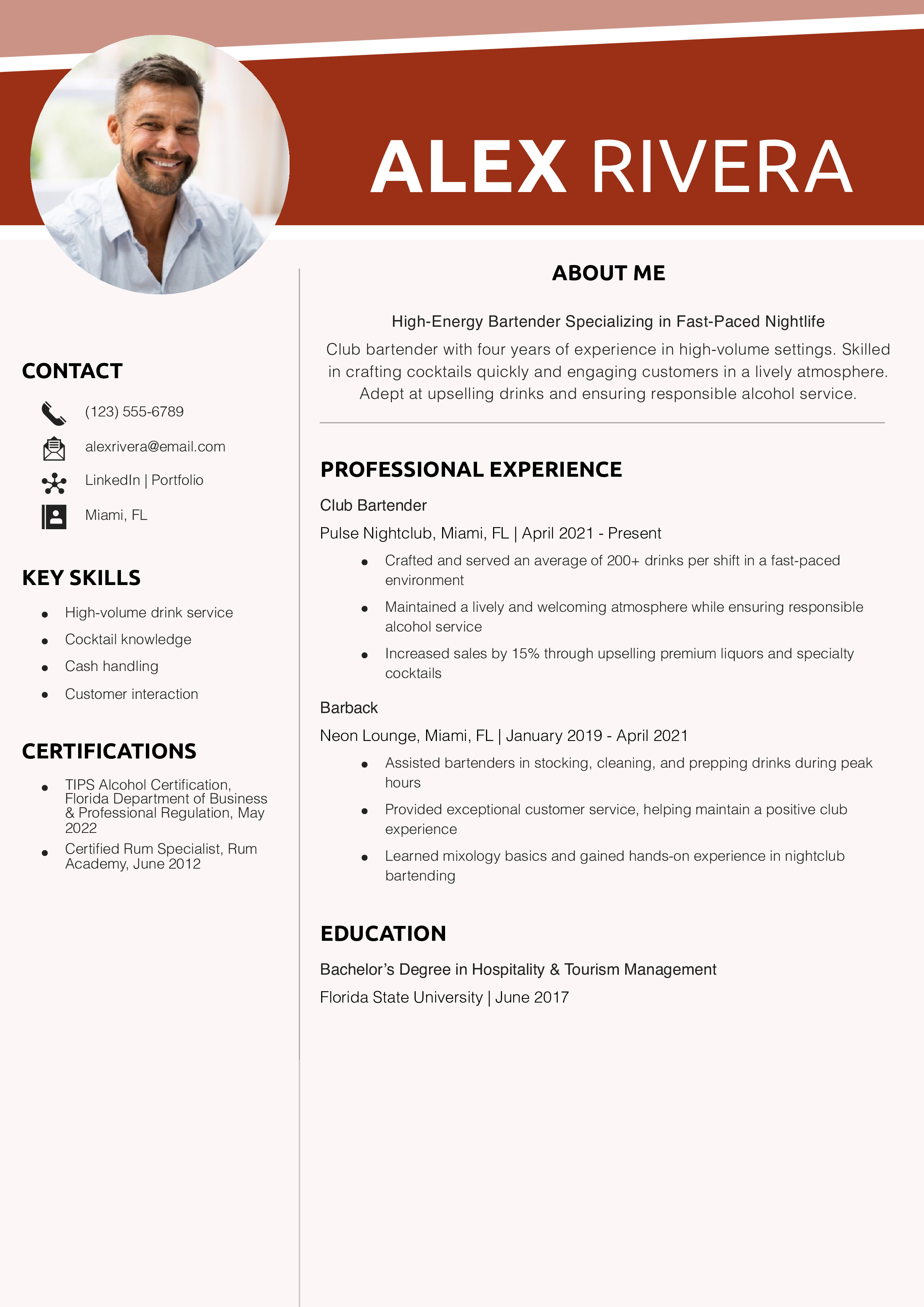
Why This Resume Is a Great Example
Alex’s resume highlights his ability to handle high-energy environments while maximizing revenue through upselling. His experience progression from barback to bartender demonstrates career growth and dedication to the industry.
How To Tailor a Resume to a Job Description
Nightclub Bartender Resume Example
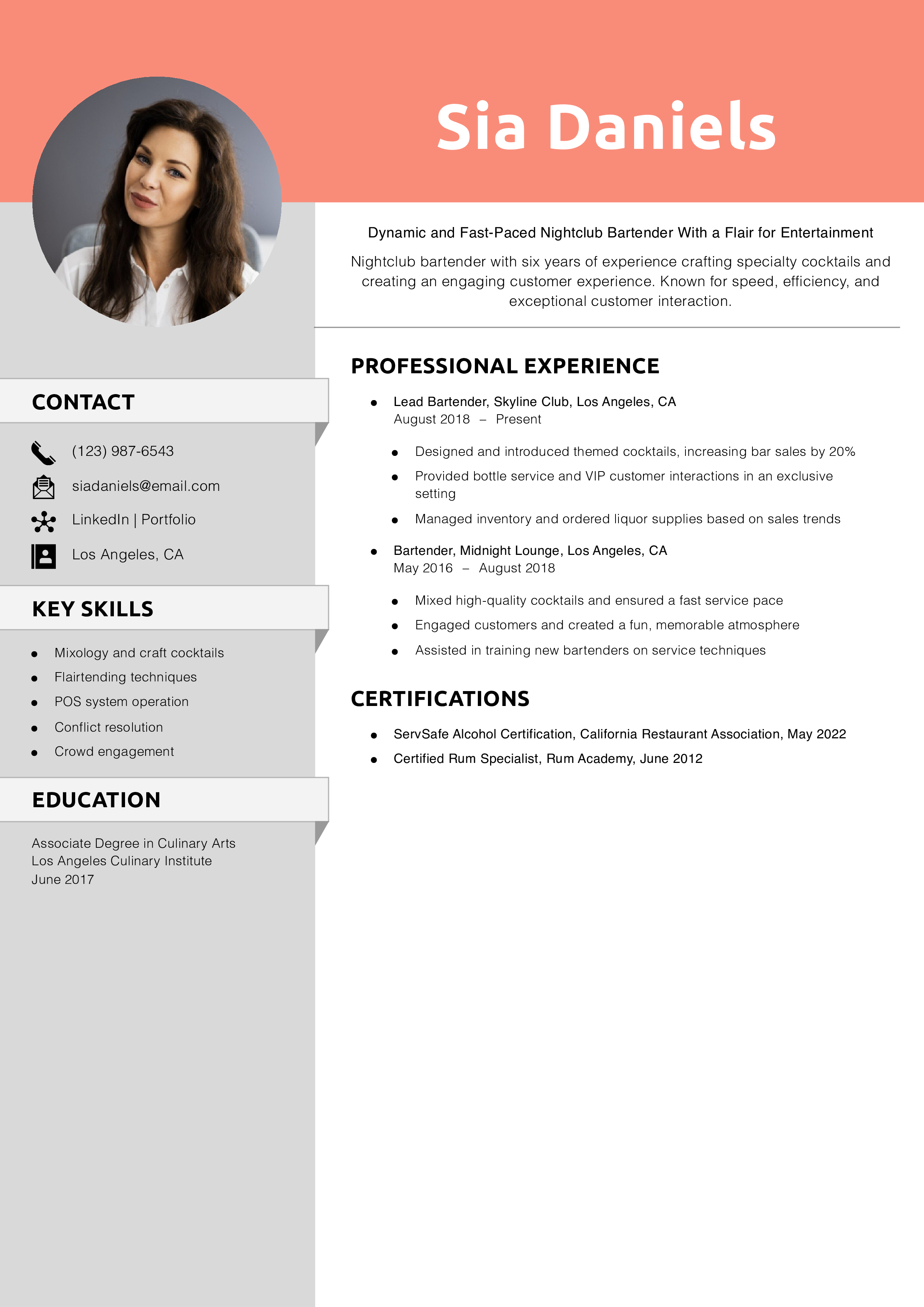
Why This Resume Is a Great Example
Sia’s resume stands out by emphasizing her ability to create a fun and engaging environment, a crucial skill for nightclub bartenders. Her leadership experience and specialty drink creations add value to potential employers.
Banquet Bartender Resume Example
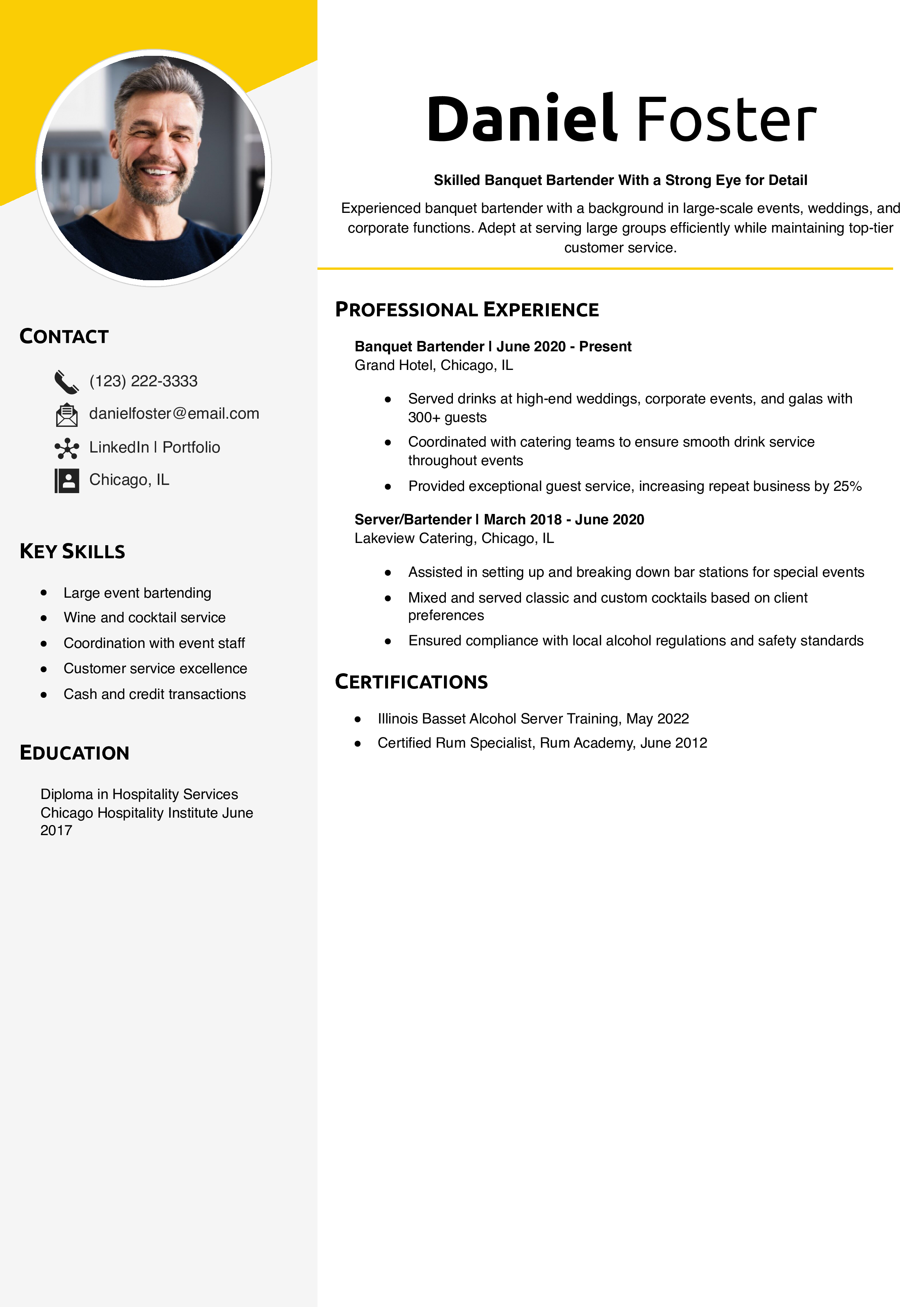
Why This Resume Is a Great Example
Daniel’s resume highlights his ability to manage high-profile events with efficiency. The focus on large-scale service showcases his ability to work under pressure while maintaining a high level of customer satisfaction.
How To List Skills on a Resume
Brewery Bartender Resume Example
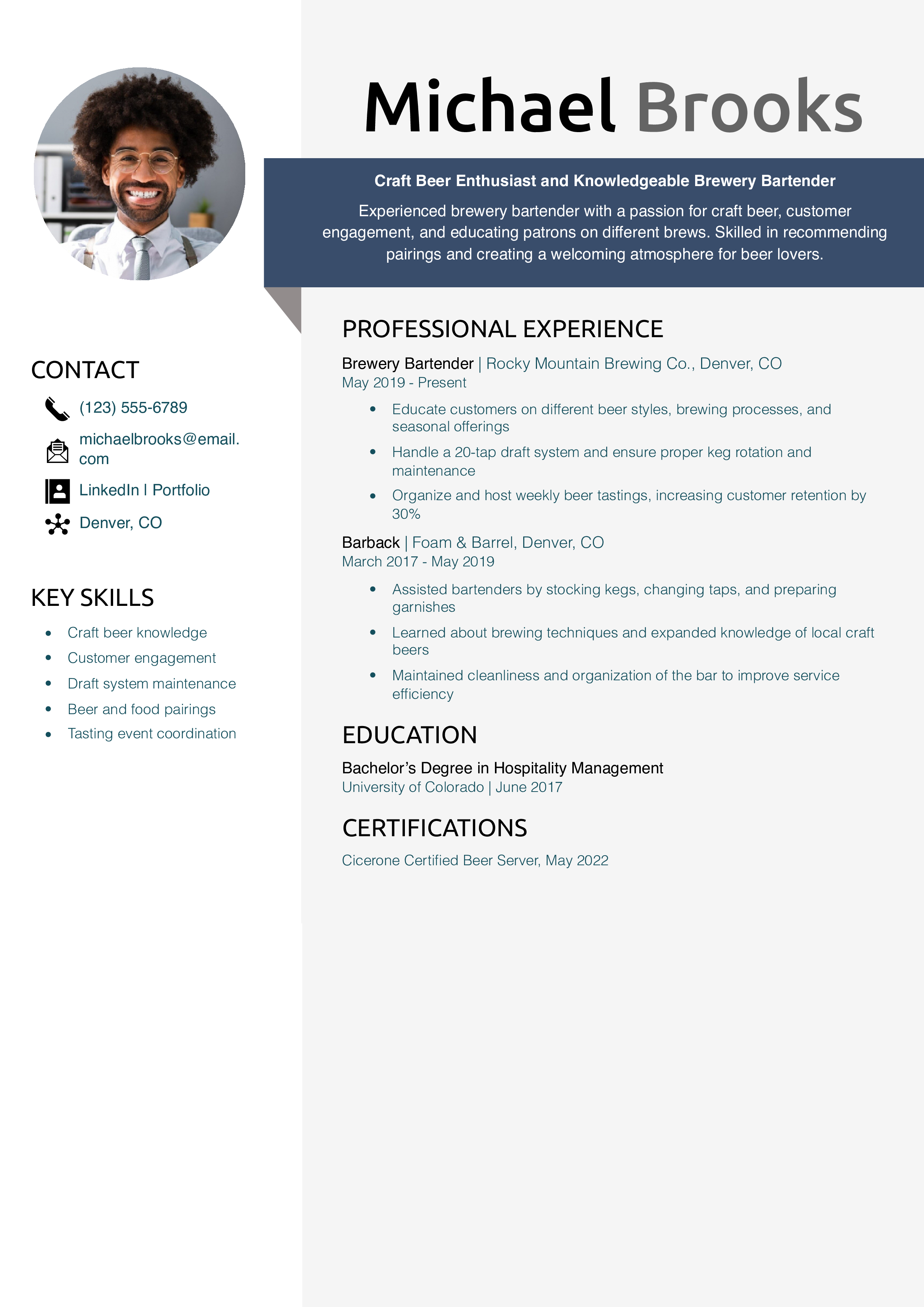
Why This Resume Is a Great Example
Michael’s resume emphasizes his specialized craft beer knowledge, which is crucial for brewery bartenders. His expertise in beer education and event hosting sets him apart from general bartenders.
Catering Bartender Resume Example
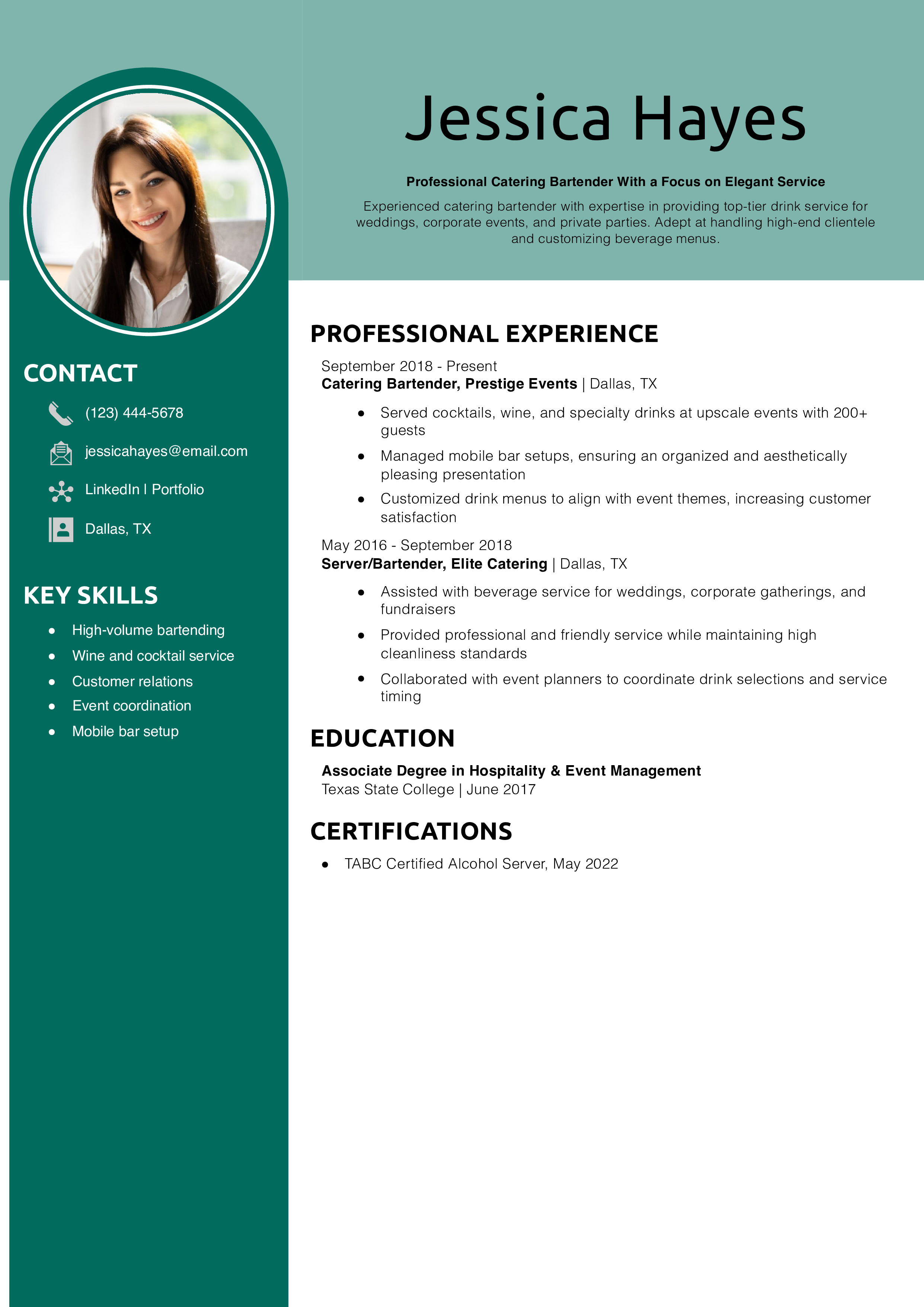
Why This Resume Is a Great Example
Jessica’s resume highlights her ability to provide refined, professional service in upscale settings. Her experience with event coordination and custom beverage menus makes her an asset to catering companies.
How To List Volunteer Experience on a Resume
Cocktail Bartender Resume Example
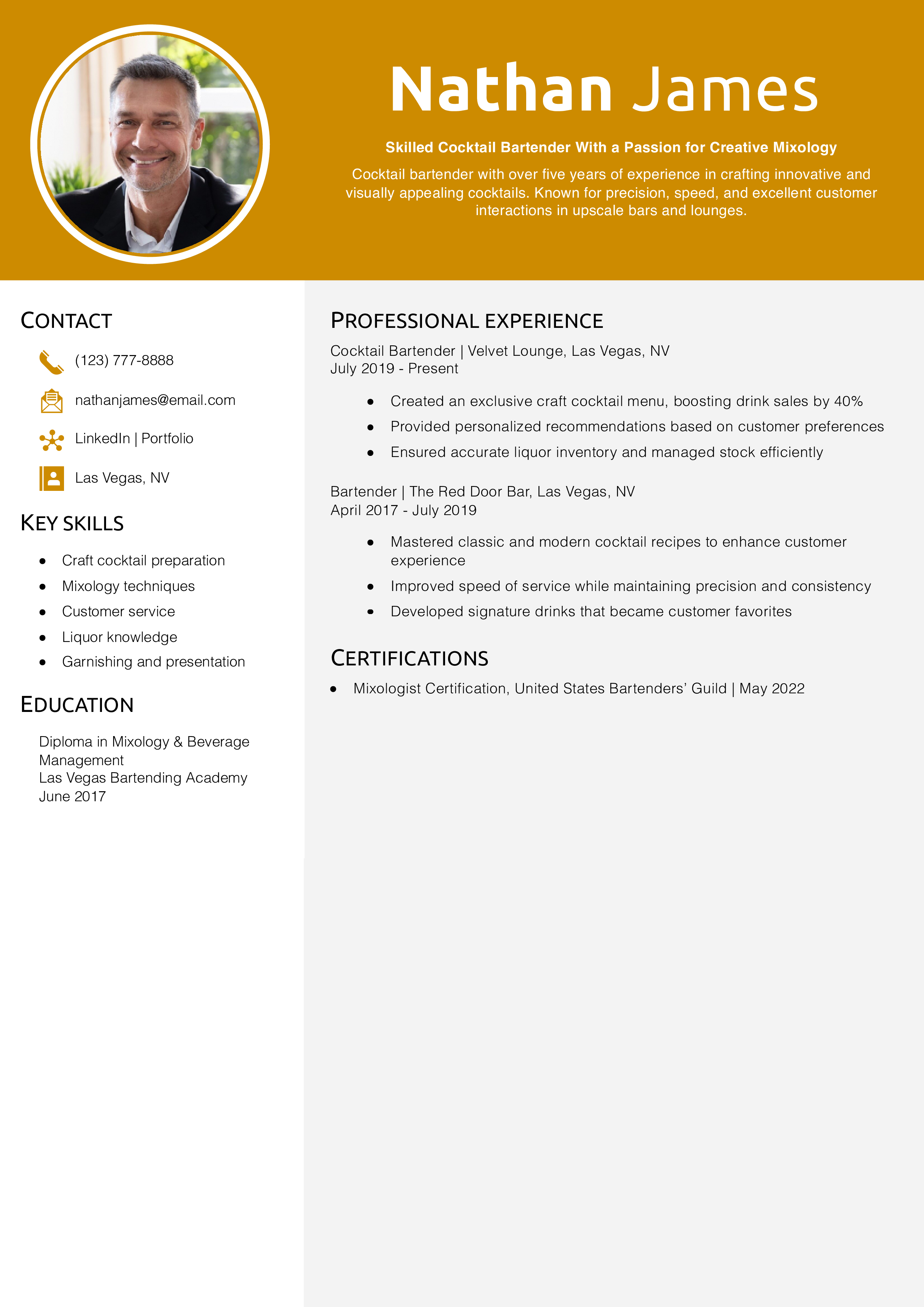
Why This Resume Is a Great Example
Nathan’s resume emphasizes his expertise in mixology and cocktail innovation. His ability to develop custom drinks and manage liquor inventory highlights his industry knowledge.
Country Club Bartender Resume Example
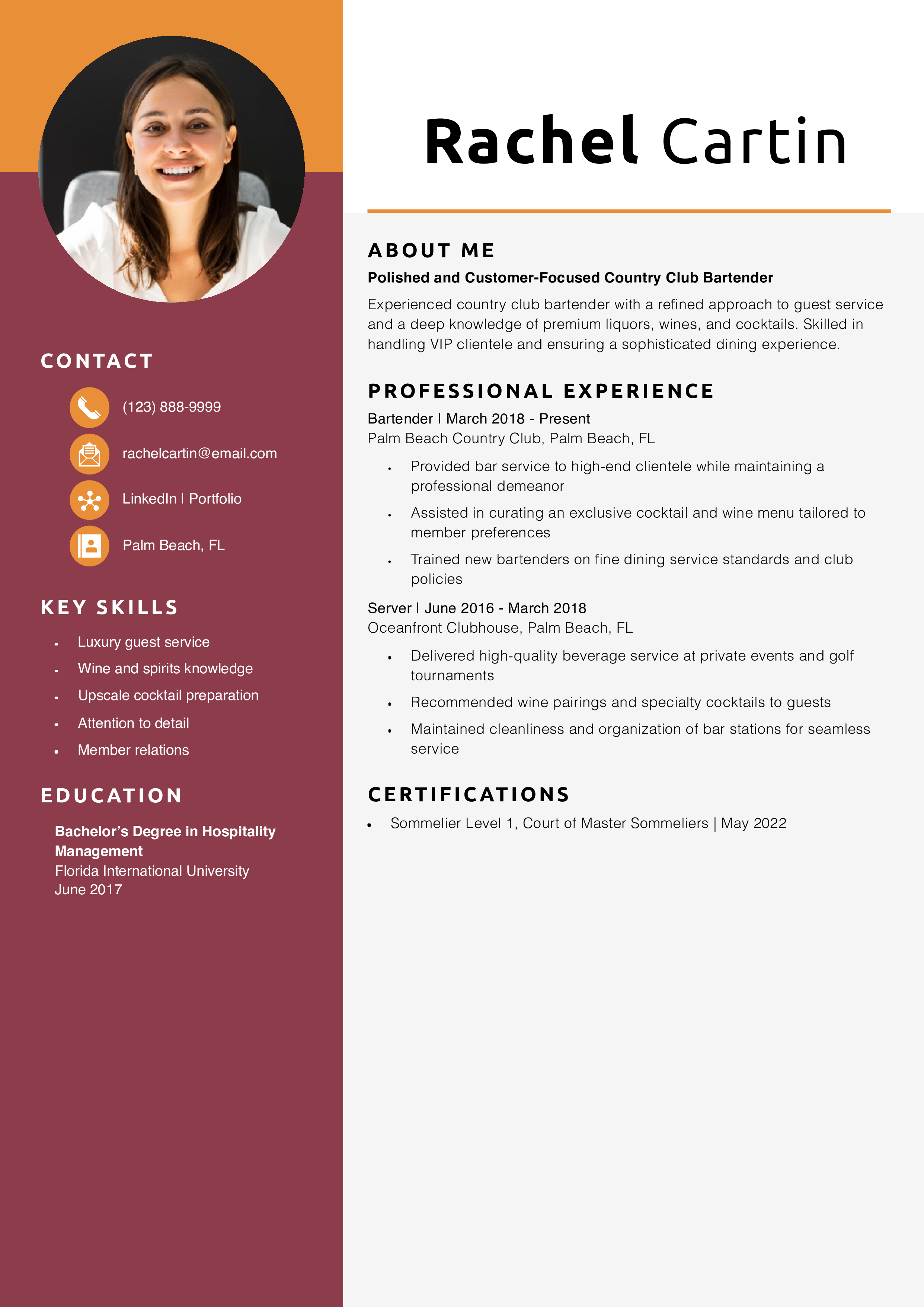
Why This Resume Is a Great Example
Rachel’s resume is tailored for country club settings, emphasizing her refined service approach and expertise in high-end drinks. Her ability to curate specialty menus and provide VIP service makes her a valuable asset.
Hotel Bartender Resume Example
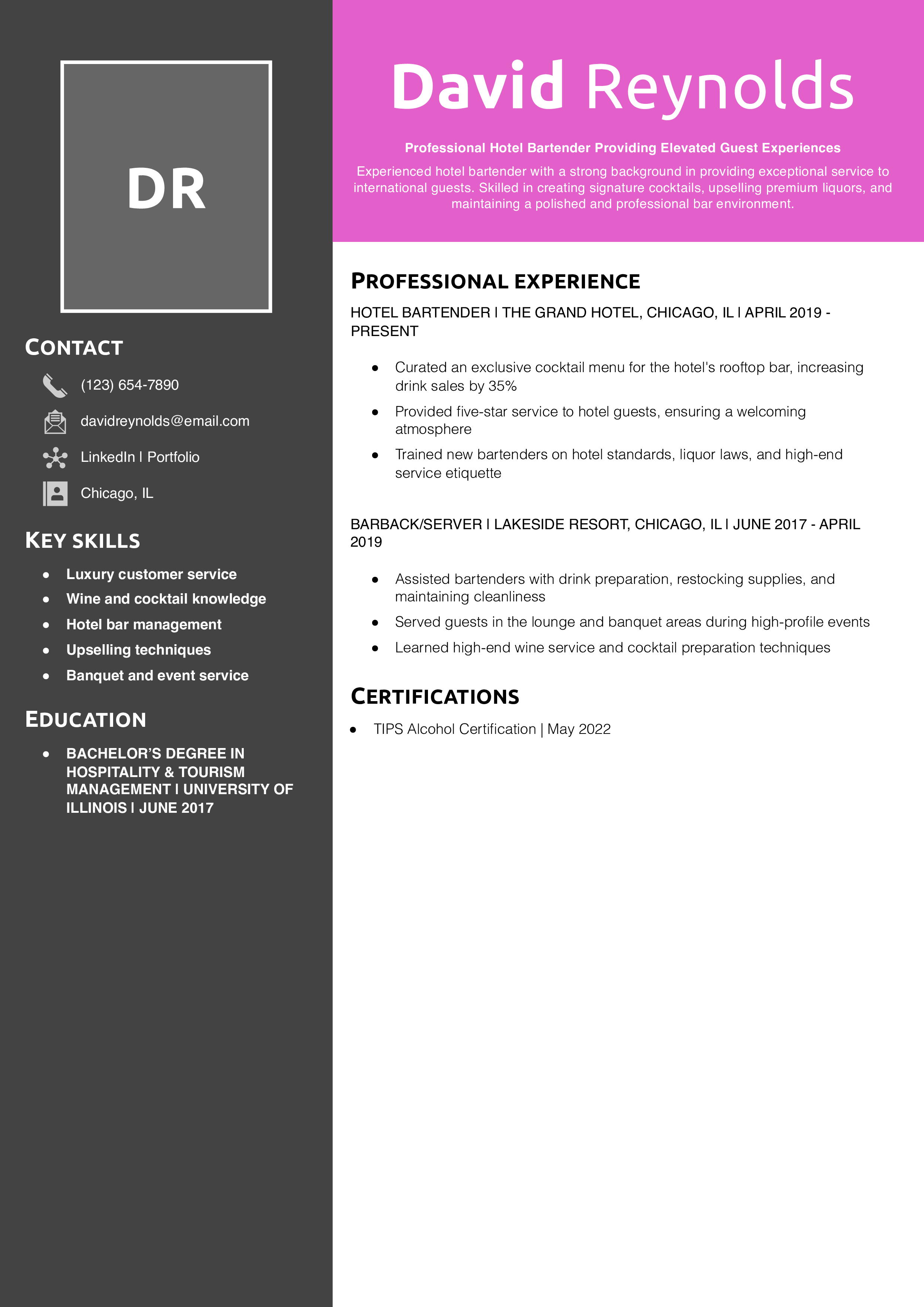
Why This Resume Is a Great Example
David’s resume highlights his ability to provide upscale service in a hotel setting. His experience creating specialty cocktails and training staff demonstrates leadership and industry expertise.
Resort Bartender Resume Example
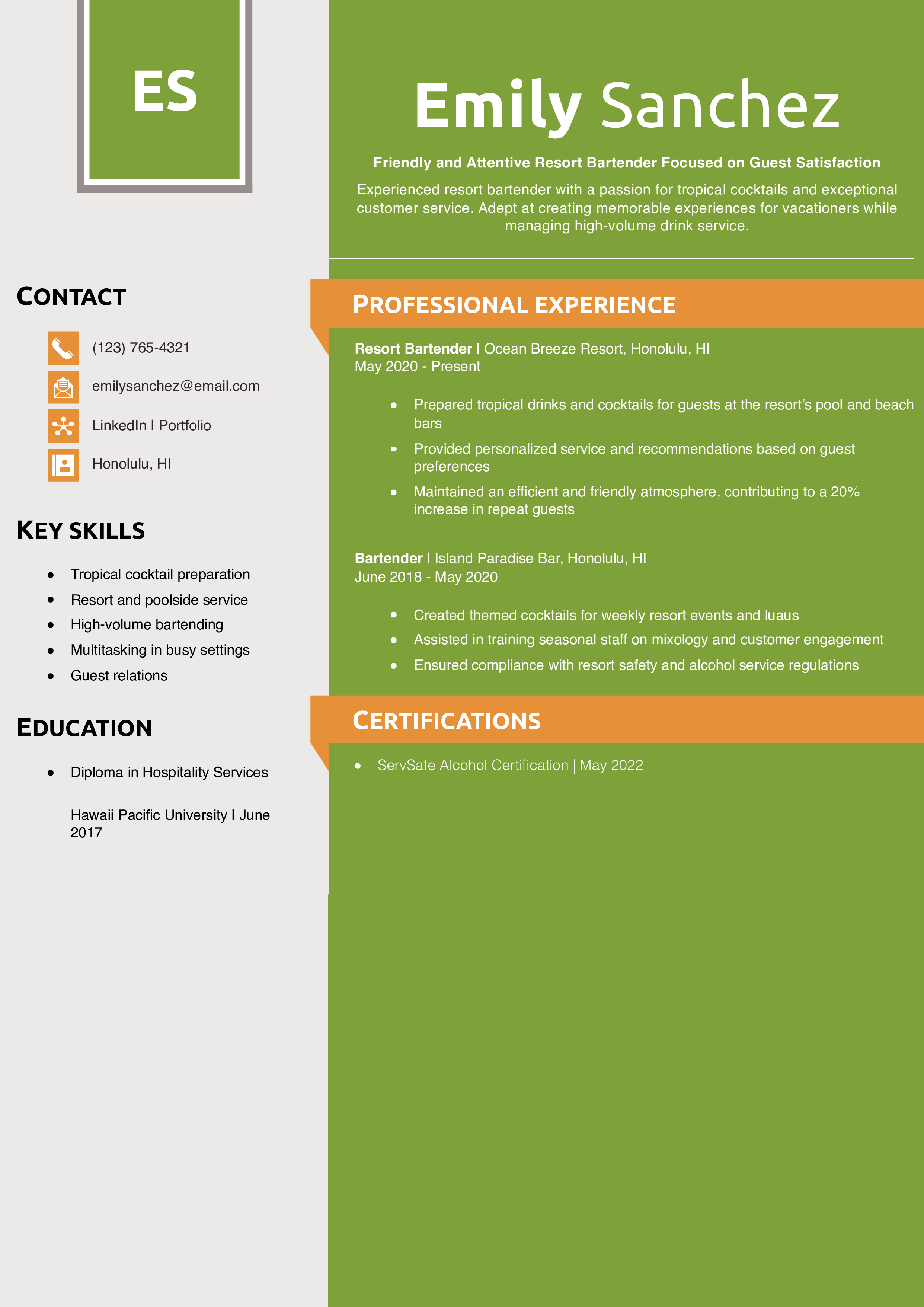
Why This Resume Is a Great Example
Emily’s resume showcases her ability to provide vacationers with an unforgettable experience. Her expertise in tropical cocktails and resort hospitality makes her a strong candidate for luxury destinations.
Fine Dining Bartender Resume Example
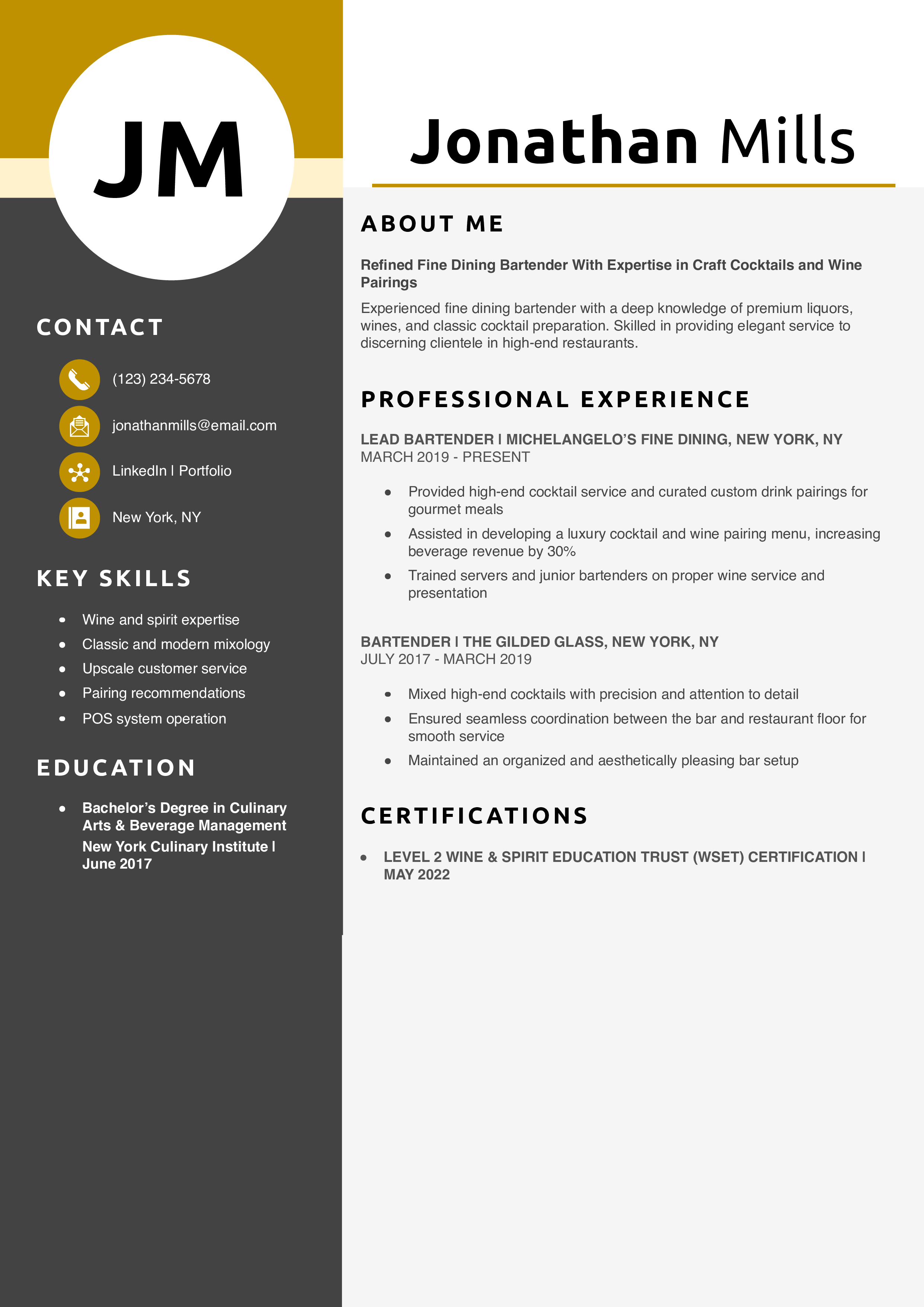
Why This Resume Is a Great Example
Jonathan’s resume emphasizes his refined service approach and expertise in premium cocktails and wine pairings. His fine dining experience demonstrates his ability to work in upscale environments.
How To List Education on a Resume
Festival Bartender Resume Example
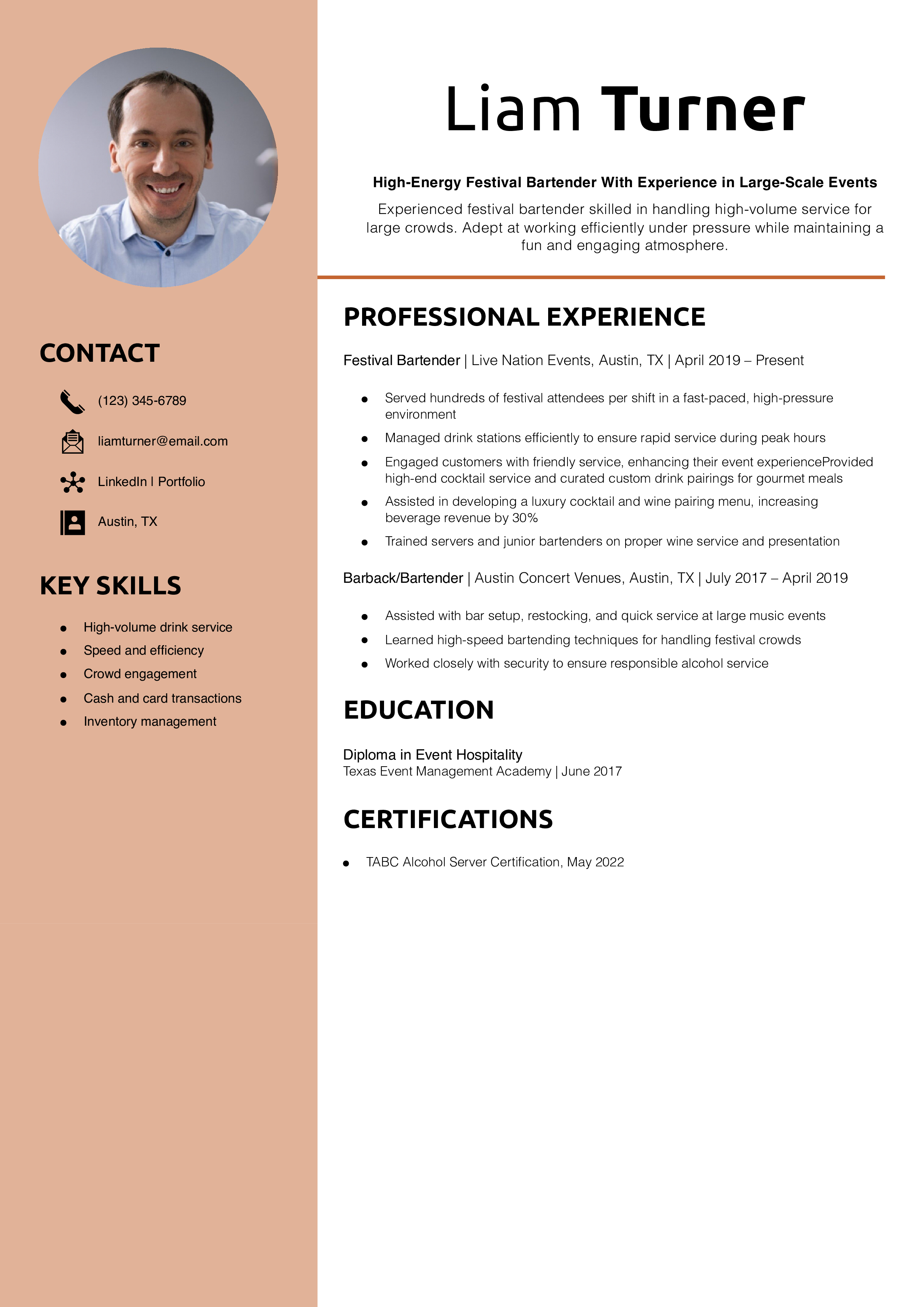
Why This Resume Is a Great Example
Liam’s resume showcases his ability to handle high-volume, fast-paced service environments. His experience with large festivals highlights his ability to work under pressure while maintaining quality service.
How Many Jobs Should You List on a Resume?
Cruise Ship Bartender Resume Example
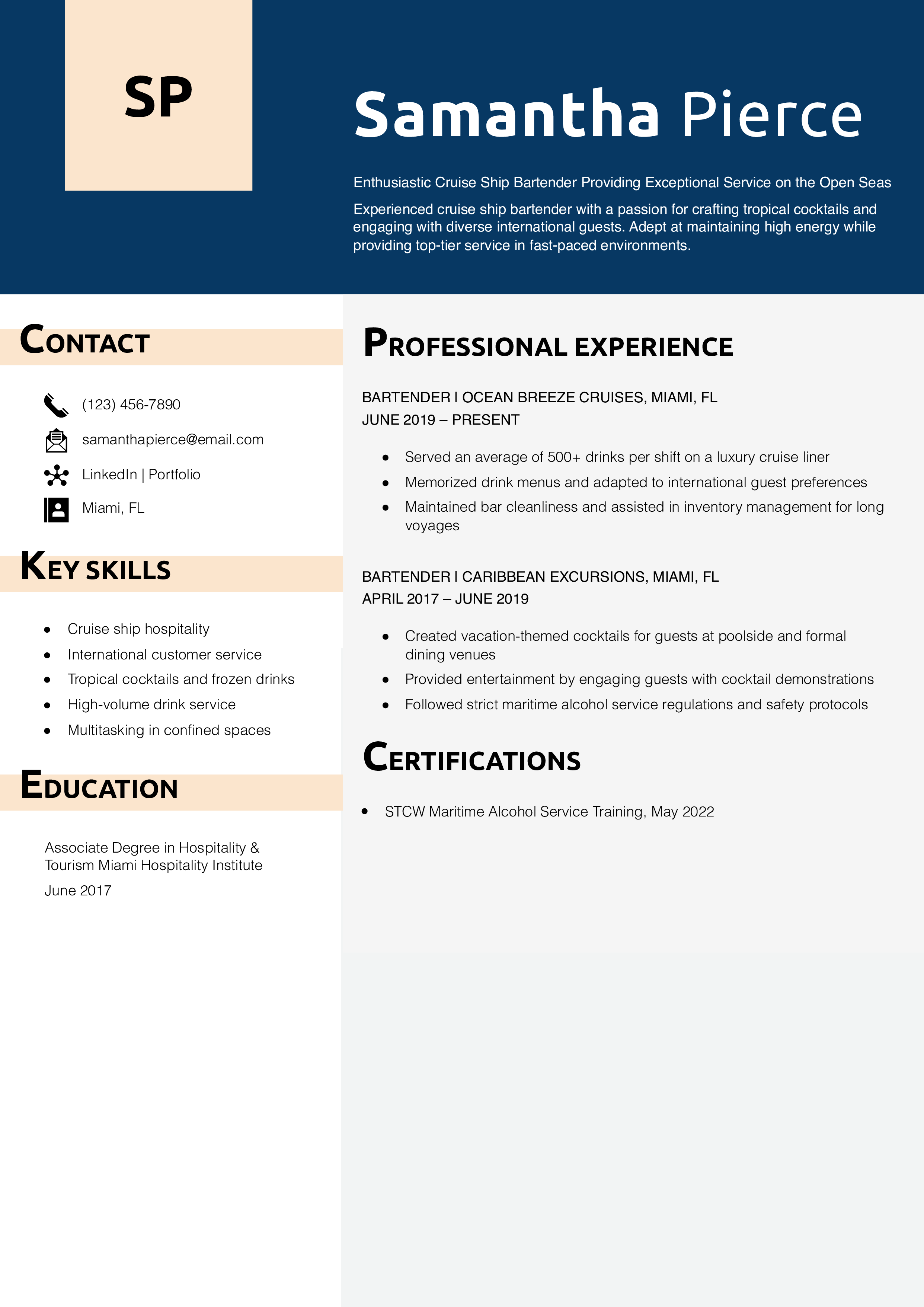
Why This Resume Is a Great Example
Samantha’s resume showcases her ability to handle fast-paced, high-energy environments while catering to international guests. Her expertise in tropical cocktails and maritime regulations makes her an excellent fit for cruise lines.
Sports Bar Bartender Resume Example
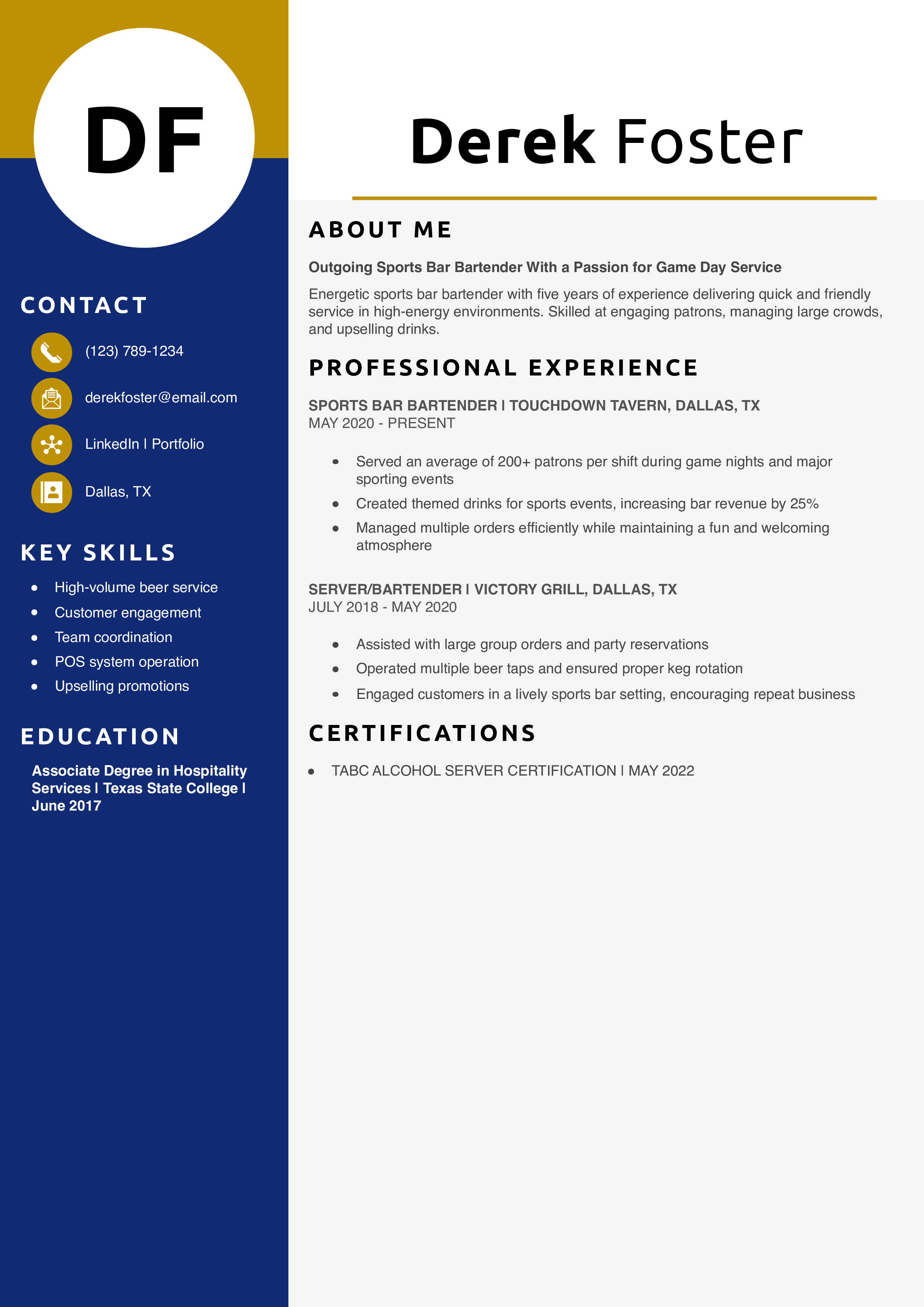
Why This Resume Is a Great Example
Derek’s resume emphasizes his ability to manage large crowds and provide efficient service during busy events. His experience creating game-day promotions adds value to any sports bar.
Speakeasy Bartender Resume Example
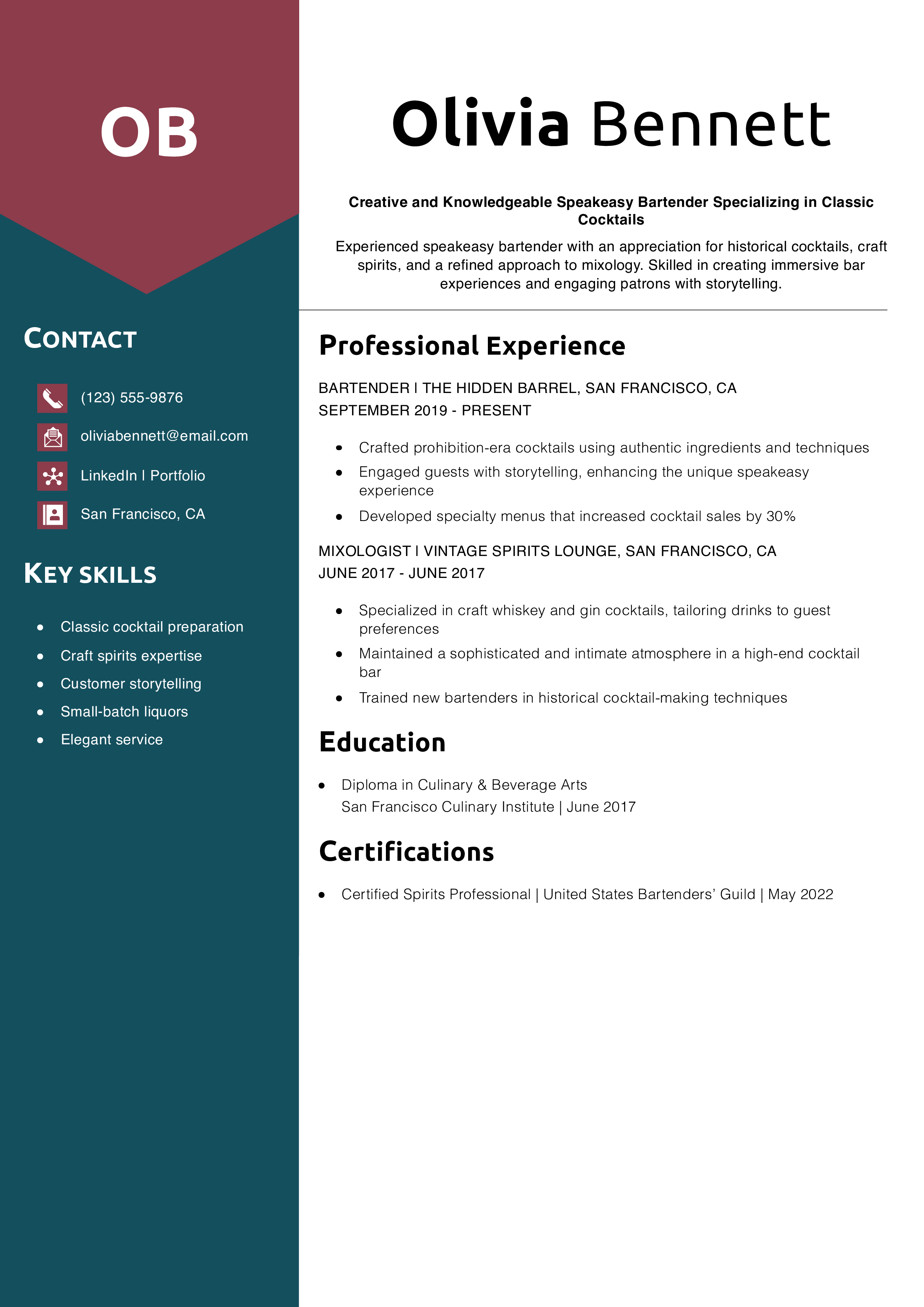
Why This Resume Is a Great Example
Olivia’s resume highlights her deep knowledge of craft cocktails and immersive guest experiences. Her ability to educate guests while serving high-end drinks makes her ideal for speakeasy settings.
How To Write a Convincing Resume Profile
Hotel Rooftop Bar Bartender Resume Example
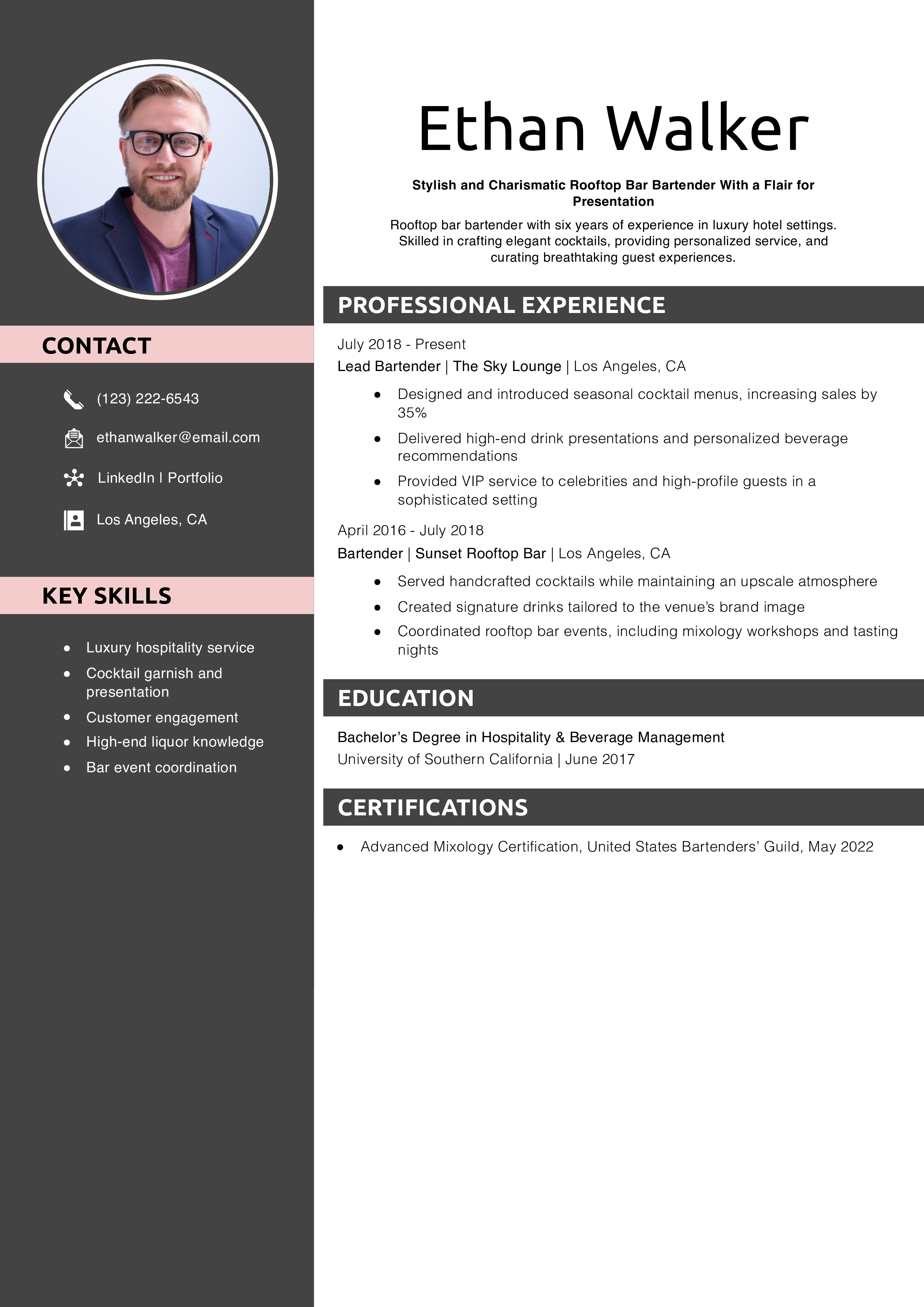
Why This Resume Is a Great Example
Ethan’s resume focuses on the upscale nature of rooftop bar service. His experience creating high-end cocktails and catering to VIP clientele makes him a standout candidate for luxury venues.
How To Build a Resume for Free
Mobile Bartender Resume Example
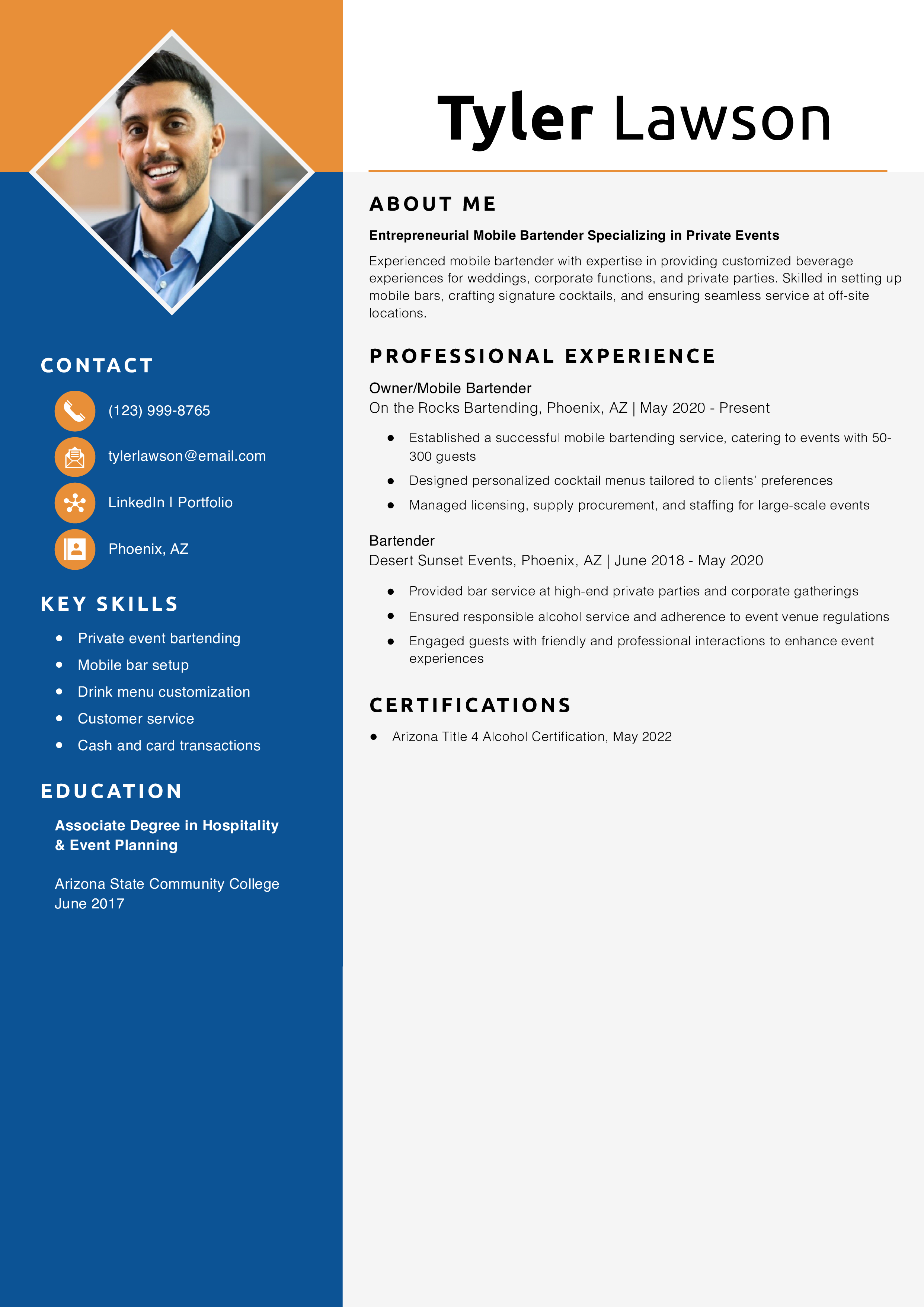
Why This Resume Is a Great Example
Tyler’s resume highlights his entrepreneurial success and ability to manage mobile bartending operations. His experience in menu customization and private event service makes him a strong candidate for freelance and catering roles.
How To Build a Professional Resume
Airport Lounge Bartender Resume Example
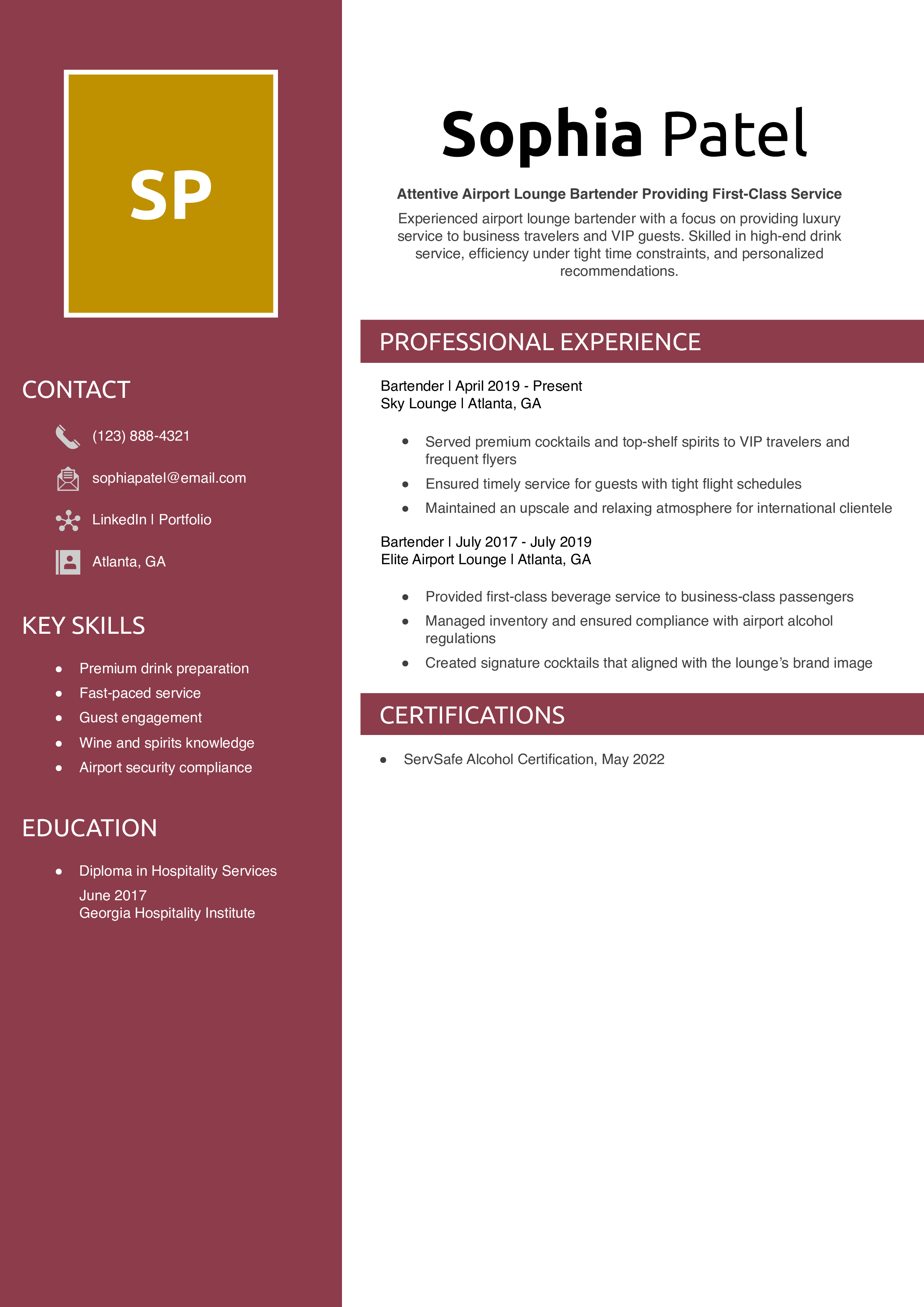
Why This Resume Is a Great Example
Sophia’s resume highlights her ability to deliver fast yet refined service in a high-pressure setting. Her experience with high-end guests and airport compliance makes her a strong candidate for exclusive lounges.
Resume Job Description Examples
Casino Bartender Resume Example
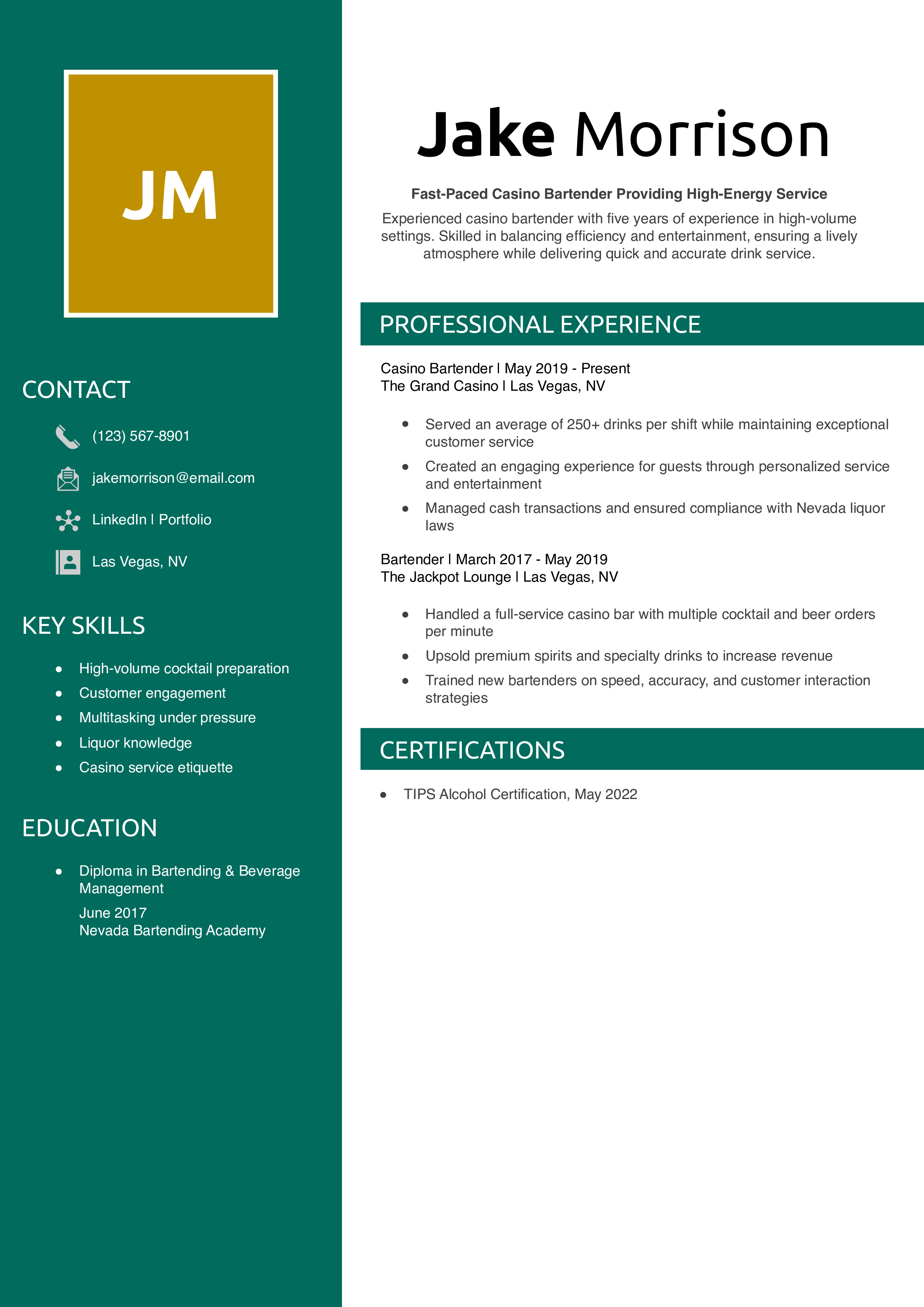
Why This Resume Is a Great Example
Jake’s resume showcases his ability to work efficiently in high-volume casino settings. His focus on speed, customer entertainment, and upselling makes him a great fit for the casino industry.
Dive Bar Bartender Resume Example
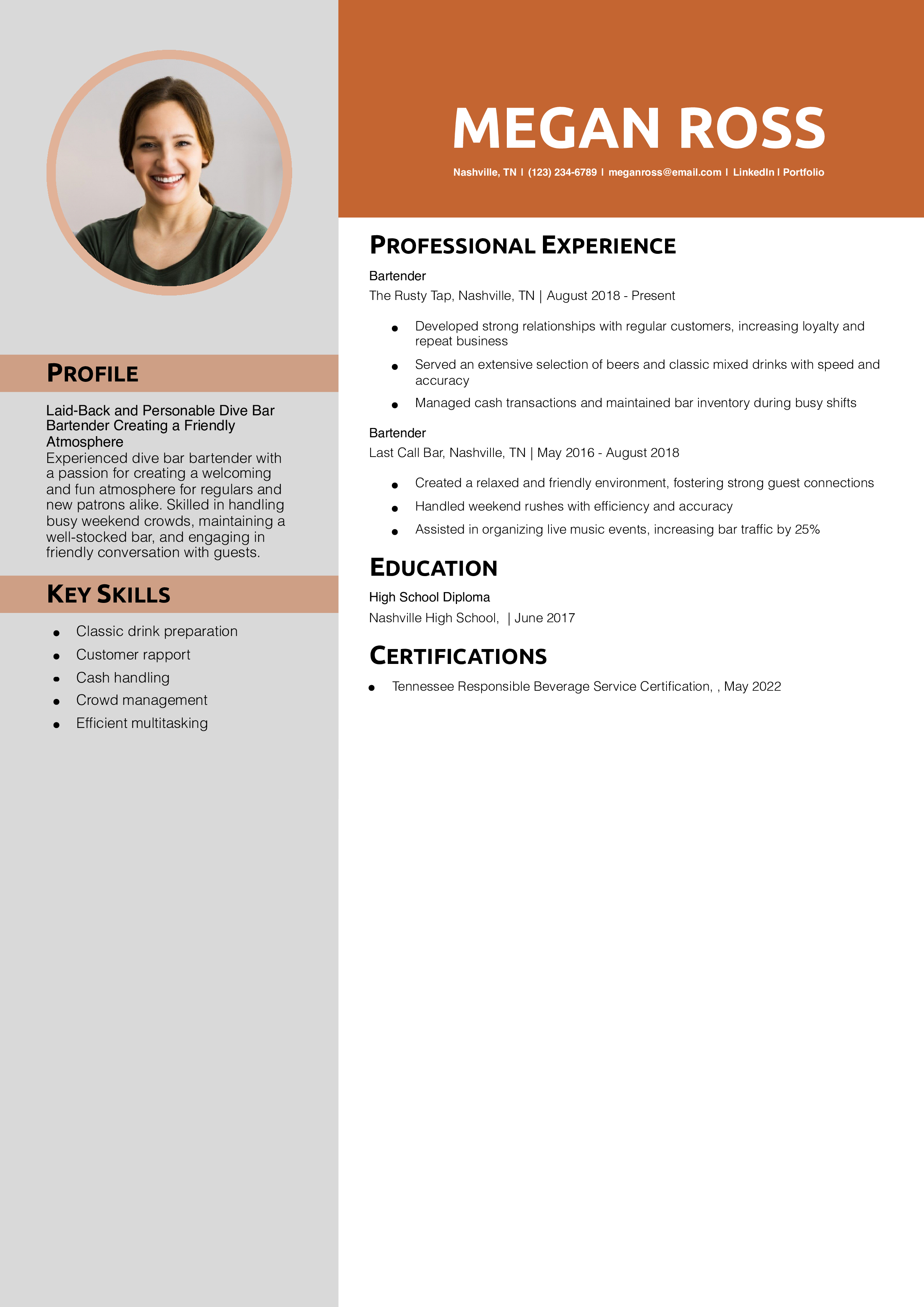
Why This Resume Is a Great Example
Megan’s resume highlights her ability to foster customer loyalty and manage busy weekend shifts. Her focus on rapport-building and efficient service makes her a perfect fit for casual bar environments.
What Is a Good Headline for a Resume?
Bartender Text-Only Resume Examples and Templates
How To Write a Bartender Resume Example
After reading your resume, restaurant managers and bar owners should be confident in your ability to handle all aspects of bartending. To create a great bartender resume, include these sections:
- Contact information
- Profile
- Key skills
- Professional experience
- Education and certifications
1. Share your contact information
At the top of your bartender resume, provide your full name, phone number, email address, location, and a link to your online professional profile if you have one. As you edit your resume, double-check your contact information to ensure everything is current and correct.
Example
Your Name
(123) 456-7890
[email protected]
City, State Abbreviation Zip Code
LinkedIn
2. Write a brief summary of your bartender qualifications
Think of your profile as the first sip of your resume — it should leave hiring managers wanting more. To create a compelling summarization of your bartending background, highlight the practical experiences and mixology skills potential employers are looking for. Distill your bartending expertise into a few sentences that match the establishment’s needs.
For example, if you’ve worked in a craft cocktail lounge and have expert knowledge in infusing spirits and syrups, mention that. Or, perhaps you’re applying for a bartender job in a high-end restaurant, and you happen to have sommelier experience pairing wines. Communicate these key qualifications immediately by including them in your profile.
Senior-Level Profile Example
Lead bartender and certified mixologist with over a decade of progressive experience in prestigious New York City bars. A leader who enjoys developing bar staff into proactive, guest-focused team members. Thrives in a high-volume, fast-paced environment. Bachelor’s degree in hospitality and tourism management.
Entry-Level Profile Example
Enthusiastic bartender with three years of experience in food service and hospitality. Certified in food and alcohol safety. Team player who collaborates well in high-pressure environments. Attention to detail and an outgoing personality ensure memorable experiences for guests. A knack for creating personalized drinks and pairing beer, wine, and cocktails.
3. Outline your bartender experience in a compelling list
Prove you can keep up with the over 700,000 currently employed bartenders by crafting a strong professional experience section. Put your beverage mastery on display with concise descriptions of your past responsibilities and achievements. Give examples of your technical skills, teamwork, and customer service orientation in action.
In addition to pulling taps and popping corks, describe those behind-the-scenes moments when you’ve managed inventory or dived into the business side of bartending. If you’ve taken on the role of trainer or mentor, discuss the success you’ve had leading bar staff. Demonstrate that you’re a well-rounded candidate who can handle all aspects of bar operations.
Senior-Level Professional Experience Example
Lead Bartender, The Highball Lounge, New York, NY
June 2018 – present
- Manage bar operations and generate a weekly revenue of $10,000
- Train and supervise a team of 12 bartenders and barbacks to ensure quality drink preparation and customer service
- Update cocktail menu seasonally to deliver fresh and innovative beverages
- Collaborated with bar team to increase overall customer satisfaction scores by 25% in the first six months
- Ensure all bar staff adhere to the company’s strict cleanliness and inventory standards
Entry-Level Professional Experience Example
Banquet Bartender, Lake Arrowhead Resort and Spa, Lake Arrowhead, CA
January 2023 – present
- Set up and break down temporary bars for banquet events such as weddings, corporate conferences, award ceremonies, and charity galas
- Carry out bar operations for an average of 16 banquets per quarter, servicing upwards of 300 guests at each event
- Ensure proper stock levels before and during events
- Handle transactions while maintaining a cash drawer of approximately $5,000
- Reduced waste by 10% with new garnish prep techniques
Resume writer’s tip: Quantify your experience
In addition to your barkeeping job duties, include quantified examples of how you achieved results. This helps hiring managers see the impact you’ve made in past positions and gives them a glimpse of the value you could bring to their establishment. Throughout your professional experience section, impress bar owners with some quantified results you’ve achieved.
Do
- “Collaborate with lead chef and ownership to create signature and rotating seasonal cocktail menus, contributing to a $3,000 monthly increase in beverage sales.”
Don’t
- “Create new drinks every quarter to increase sales.”
Resume writer’s tip: Tailor your resume for each application
Catering your resume for potential employers is like personalizing a drink to suit someone’s tastes. If a guest is looking for a fruity cocktail, you wouldn’t serve them a whiskey sour. So get to know the needs of each company and what they seek in a bartender. Study the job description and identify keywords, skills, and qualifications listed there.
Let’s pretend you’re interested in working for a gastropub, and its job ad mentions “artisanal cocktails,” “local ingredient sourcing,” and “whiskey flights.” If you’re experienced in these areas, use the same words and phrases in your resume when describing your bartending background. This helps hiring managers make the connection between your qualifications and their needs.
What if you don’t have experience?
Although bar owners usually prefer to hire experienced bar staff, many are willing to invest in people who are enthusiastic and eager to learn. So, work with the experience you do have. Focus on any relevant education or certifications specific to bartending and extract transferable skills like communication, multitasking, and coachability.
For example, if you have volunteer experience in a food or drink service setting, highlight skills you used in relation to bartending. This could include things like maintaining a clean workspace, creating a welcoming atmosphere, and working on a team.
4. Add bartender education and certifications
Bartender jobs usually only require a high school diploma. However, if you’ve had additional schooling, start with your highest level of education. Provide the name of the school and dates of attendance. Then, include any relevant certifications you’ve earned in preparation for the job.
If your state requires special licensing to serve alcohol and food, and you’ve already taken the necessary exams, include that information as well. Every relevant detail about your knowledge counts. For example, a special mixology certificate could make the difference between you and another well-qualified candidate.
Education
Template:
[Degree Name]
[School Name], [City, State Abbreviation] | [Graduation Year]
Example:
Associate of Science (A.S.) in Hospitality Management
San Francisco State University, San Francisco, CA | June 2017
Certifications
Template:
[Certification Name], [Awarding Organization], [Completion Year]
Example:
Responsible Beverage Server, Alcoholic Beverage Control, 2022
5. List key bartender skills and proficiencies
Working directly with the public requires a balanced blend of hard and soft skills, and creating a key skills section will display your bartending abilities. Be mindful of what you include by ensuring your list aligns with the unique requirements of the position. These requirements can change from job to job, so adapt your bartender resume for each application.
Here’s a list of common bartending skills you could include:
| Key Skills and Proficiencies | |
|---|---|
| Accuracy | Adaptability |
| Attention to detail | Bartending equipment |
| Cash handling | Conflict resolution |
| Customer focus | Effective communication |
| Flexibility | Food and wine pairing |
| Inventory management | Mixology |
| Multitasking | Point-of-sale (POS) system operation |
| Responsible beverage service | Sanitation and food safety |
| Teamwork | Time management |
Resume writer’s tip: Use descriptive action verbs
Bartending takes initiative and proactive engagement with guests. Using action verbs can help you communicate this element of your work. Instead of simply listing responsibilities, show how you actively contributed to the smooth operation of the bar. Communicate your bartending duties and accomplishments concisely using the action verbs below:
| Action Verbs | |
|---|---|
| Adapted | Crafted |
| Customized | Elevated |
| Enhanced | Executed |
| Fostered | Greeted |
| Implemented | Innovated |
| Mixed | Optimized |
| Poured | Served |
| Streamlined | |
How To Pick the Best Bartender Resume Template
As a bartender, you know presentation matters. Just like selecting the perfect glassware for a drink, choosing the right resume template can be the difference between getting noticed or overlooked.
Bartender resumes do best with a classic, clean, and professional design. Avoid complex, graphic-heavy templates that don’t read well and could distract from your career highlights. Hiring managers should be able to read through your resume with ease and capture all they need to know quickly.
Frequently Asked Questions: Bartender Resume Examples and Advice
Employment for bartenders is expected to grow at an average rate of 3% over the next decade. Although there’s a healthy demand for cocktail artisans, you’ll need a well-tailored resume to land jobs at the best establishments. The goal is to adjust every resume you submit to align with what employers are looking for.
For example, let’s say you have experience in a busy sports bar, but you’re applying for a new job at a trendy downtown nightclub. They need a bartender who can handle high-volume drink orders and create personalized cocktails on the fly. In that case, you would highlight your speed of service during peak hours and emphasize your creativity in developing new drinks.
A combination format allows you as a bartender to showcase a blend of your most important assets — your mixology skills and work history. This gives hiring managers a balanced view of your qualifications, helping them envision how you would excel behind their bar. A key skills list followed by a progressive work history is the best way for an entry-level or seasoned bartender to structure their resume.
Include a cover letter with your resume
No application is complete without the perfect garnish — a cover letter. This is your chance to speak directly to the hiring manager, introduce yourself, and explain what makes you the perfect bartender for the position. Cover letters may not always be a requirement for a bartender job, but they will help you stand out from other applicants.
Check Out Related Examples
Resume Templates offers free, HR approved resume templates to help you create a professional resume in minutes. Choose from several template options and even pre-populate a resume from your profile.

